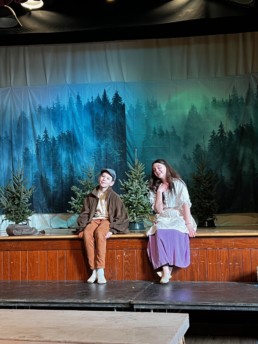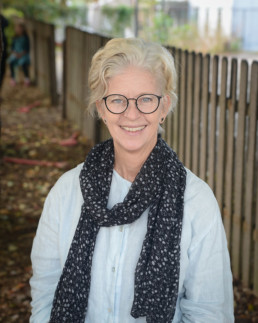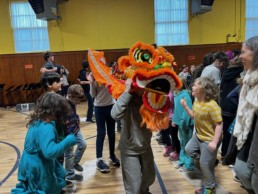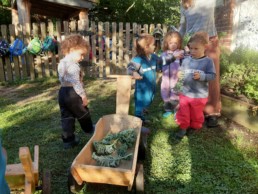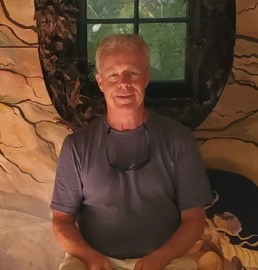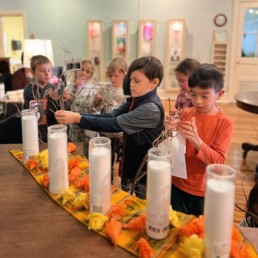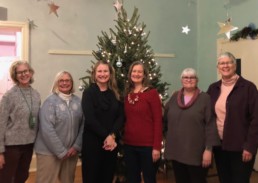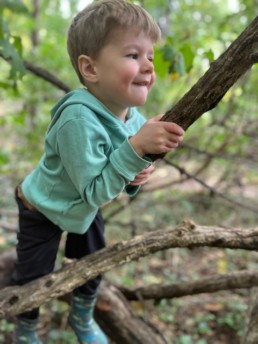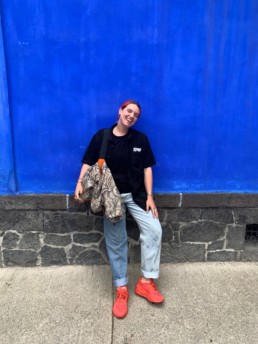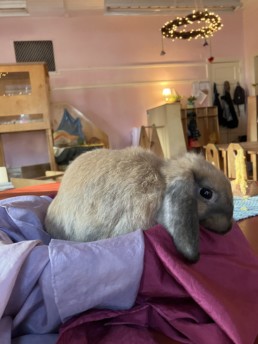Into the Woods Jr!
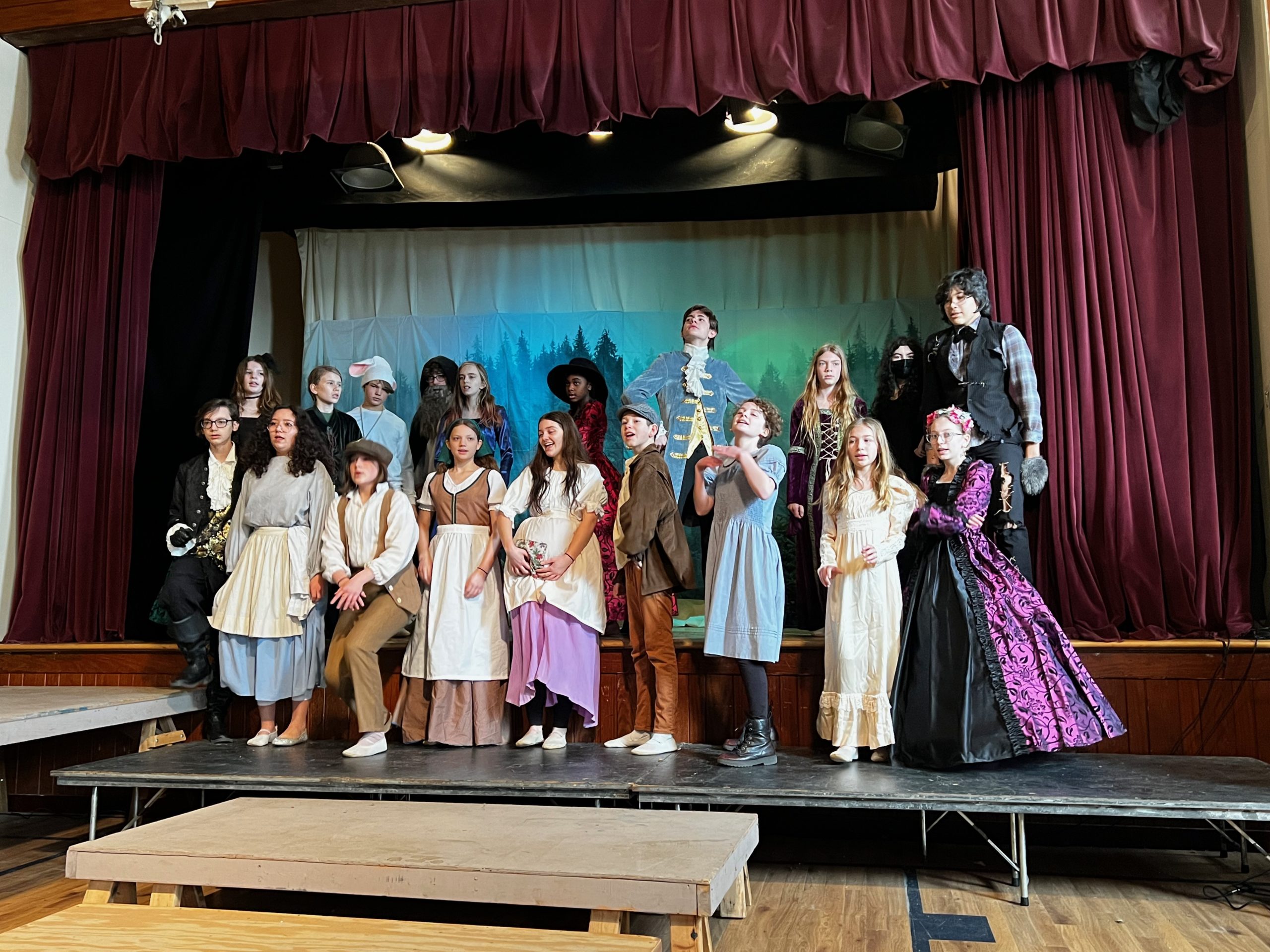

7th-grade teacher, Mrs. Dietz, and 8th-grade teacher, Ms. Tucker knew they were taking on a big project when they first began discussions of a combined 7th and 8th-grade performance of Into the Woods Jr. They knew it would take a village! This is why they asked their colleagues at the Back to School meetings in August if they were prepared and interested to help. They said yes and preparations began!
Class plays are a tradition within Waldorf education. Each class, from 1st through 8th, performs a play for their peers and families every school year. Class plays strengthen what students are learning in their curriculum, build camaraderie and cohesion among classmates, and increase self-confidence. So the 7th and 8th-grade students were no strangers to learning lines and performing. But an hour-long musical? It was a whole new endeavor!
"I wish...
more than anything...
more than the moon..."
As auditions approached, the hallways were filled with students and teachers singing the songs of the fun and lively musical. Students excitedly prepared. They wondered who would be cast as the familiar fairytale characters like Cinderella, Little Red Riding Hood, Rapunzel, and the Prince. Casting the musical was no easy task with such a talented group! The cast was announced. There was excitement. There was disappointment. As is the case in all Waldorf school plays, all students were included in the cast. Rehearsals began!
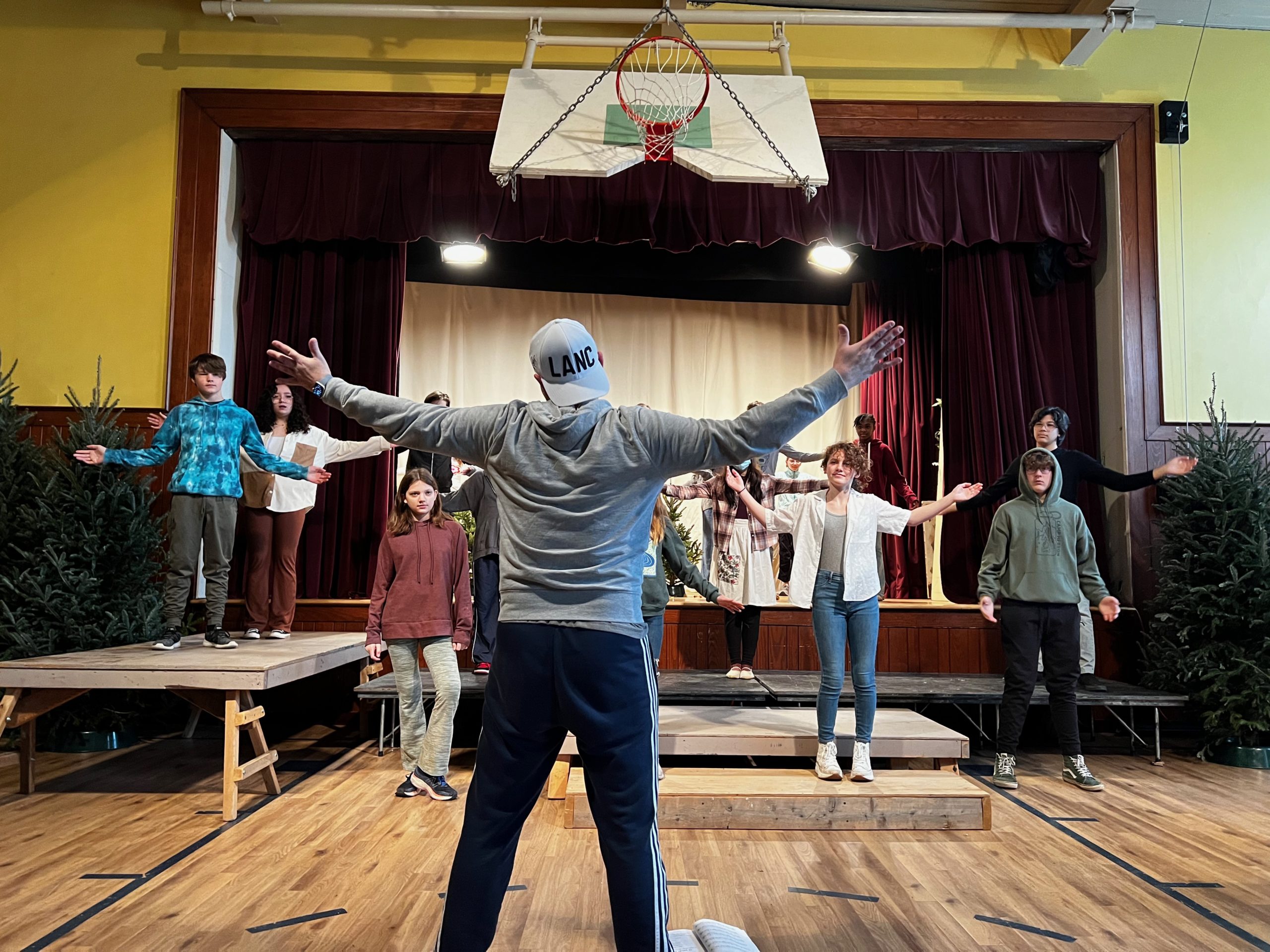

7th and 8th-grade students gathered every day to rehearse the performance. In addition to the vision and support of Mrs. Dietz & Ms. Tucker, they were fortunate to have SWS music teacher, Mrs. Radanovic, professional choreographer, Cody Smith, and pianist (and SWS parent), Justin Badgerow to help bring the creative vision to life. Students learned the music, their lines, cues, and choreography. They helped build sets and brainstormed on special effects. They created beautiful handmade posters. There were good days, which were celebrated. There were bad days, which students persisted through.
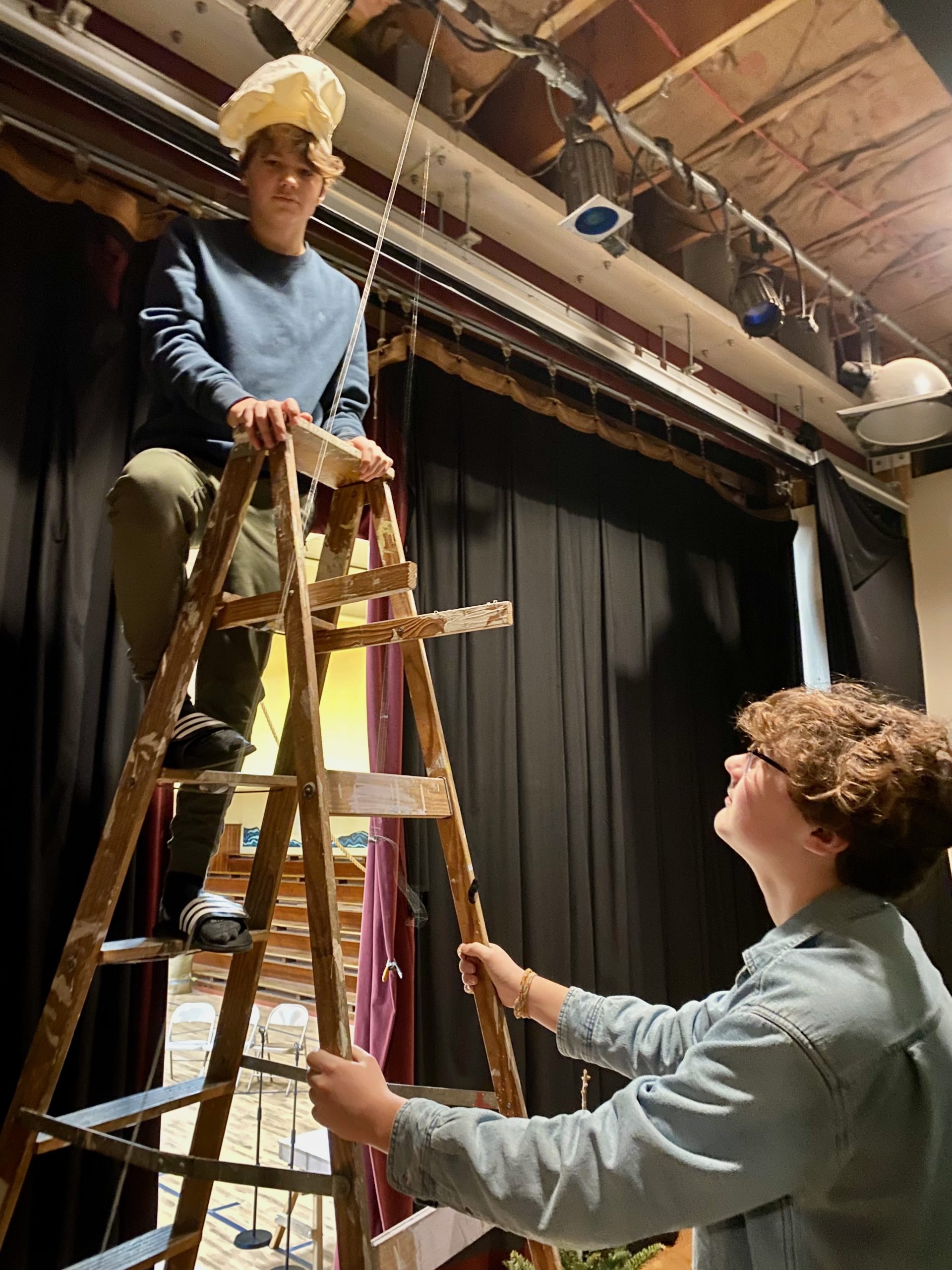

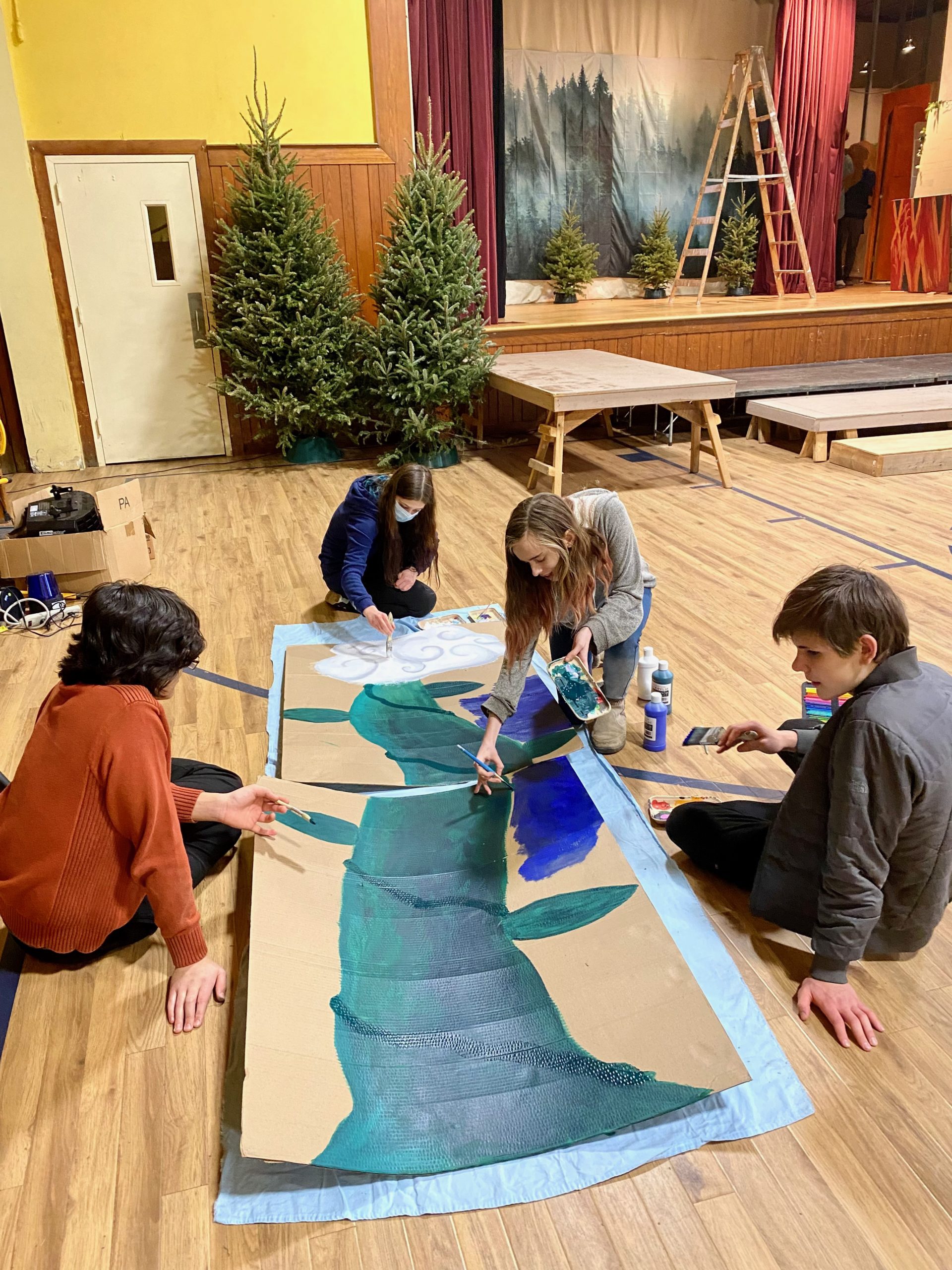

Waldorf teacher, Lawrence Joseph Glatt, explains the importance of performing a musical in middle school in the recent Performing Arts edition of School Renewal Magazine, "teaching middle school students that they are being seen, what they do matters, and that they can choose what they present to the world." He goes on to explain that musicals offer, "students at this age glimpses of what they can become."
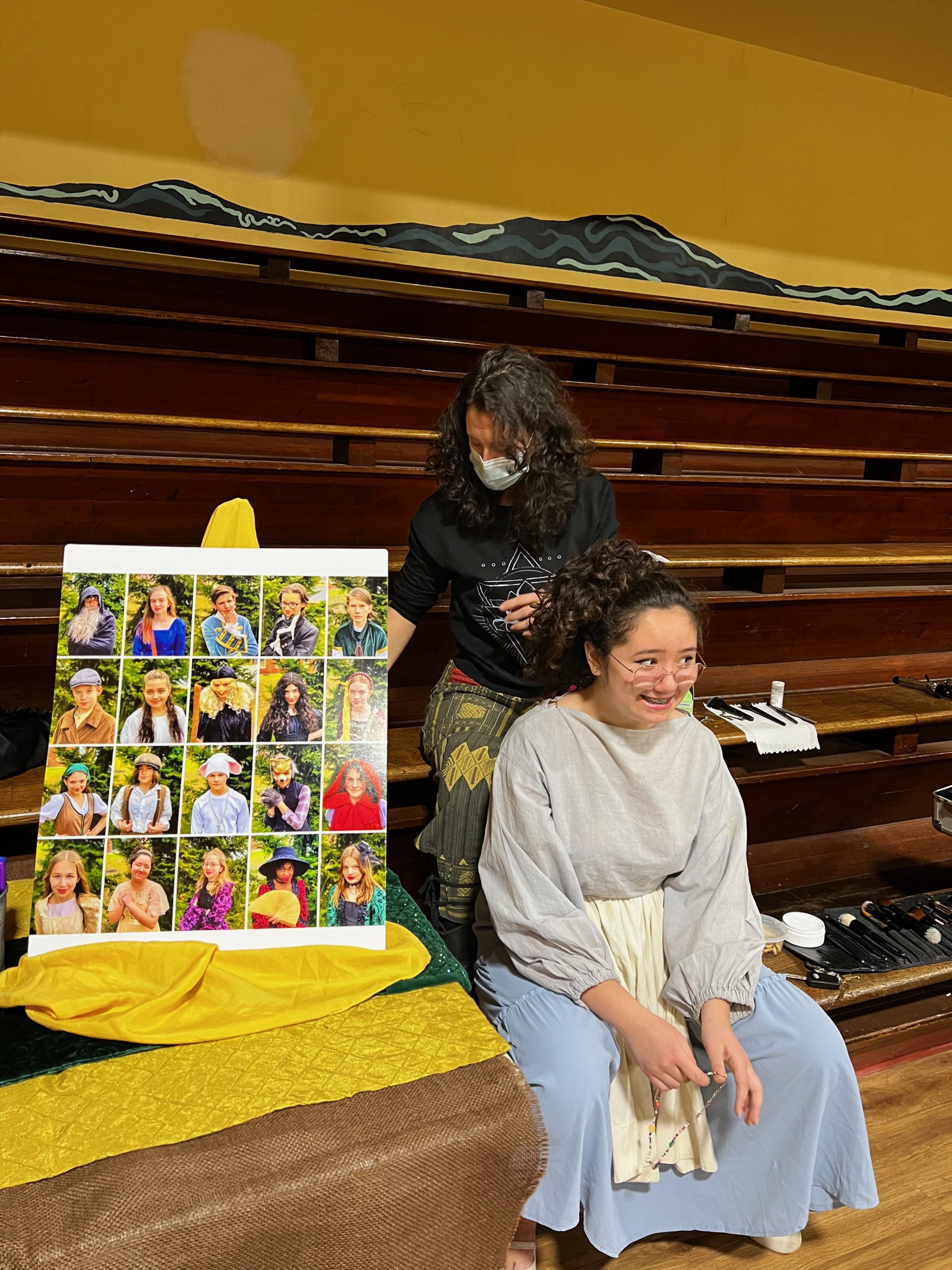

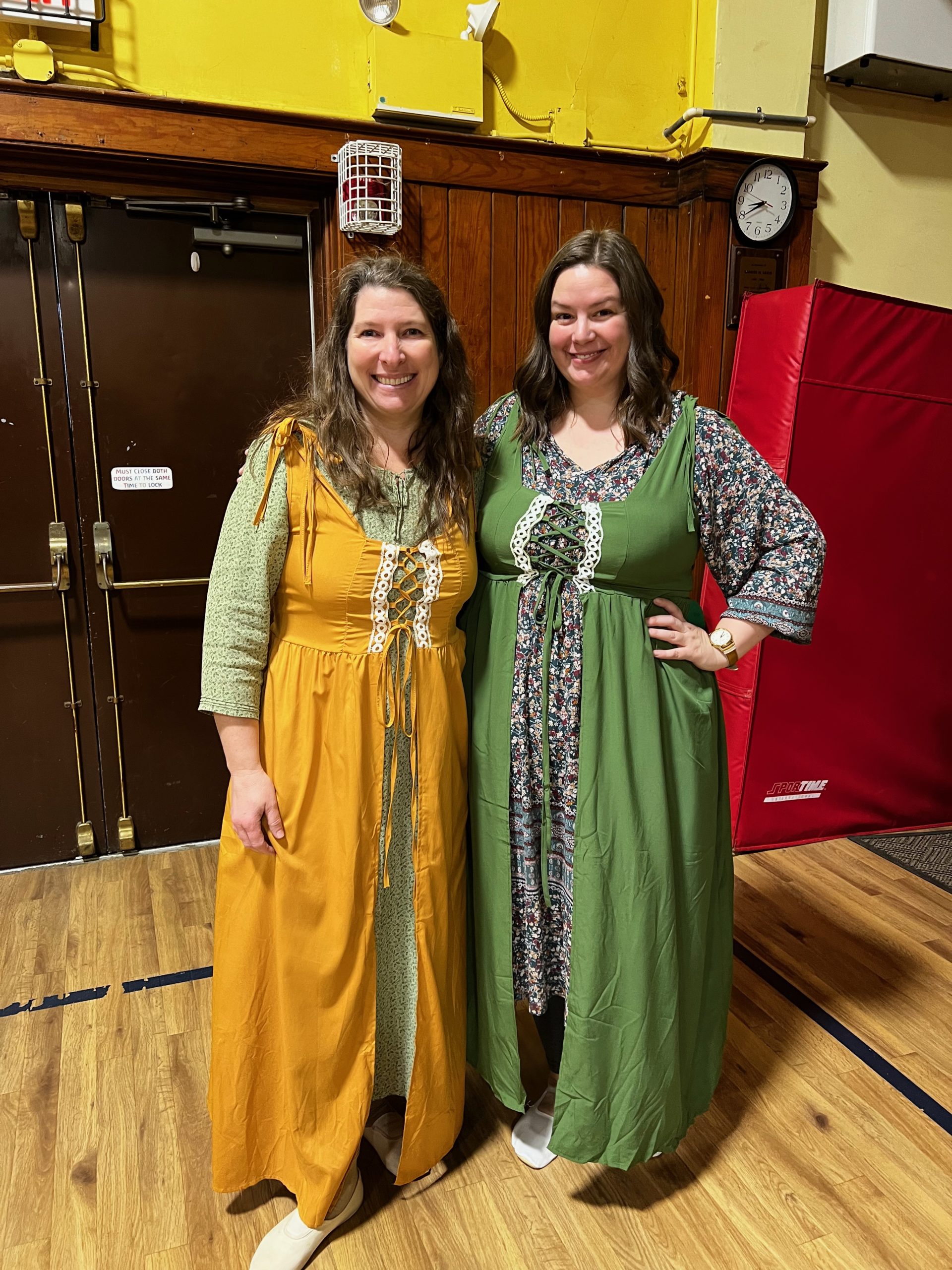

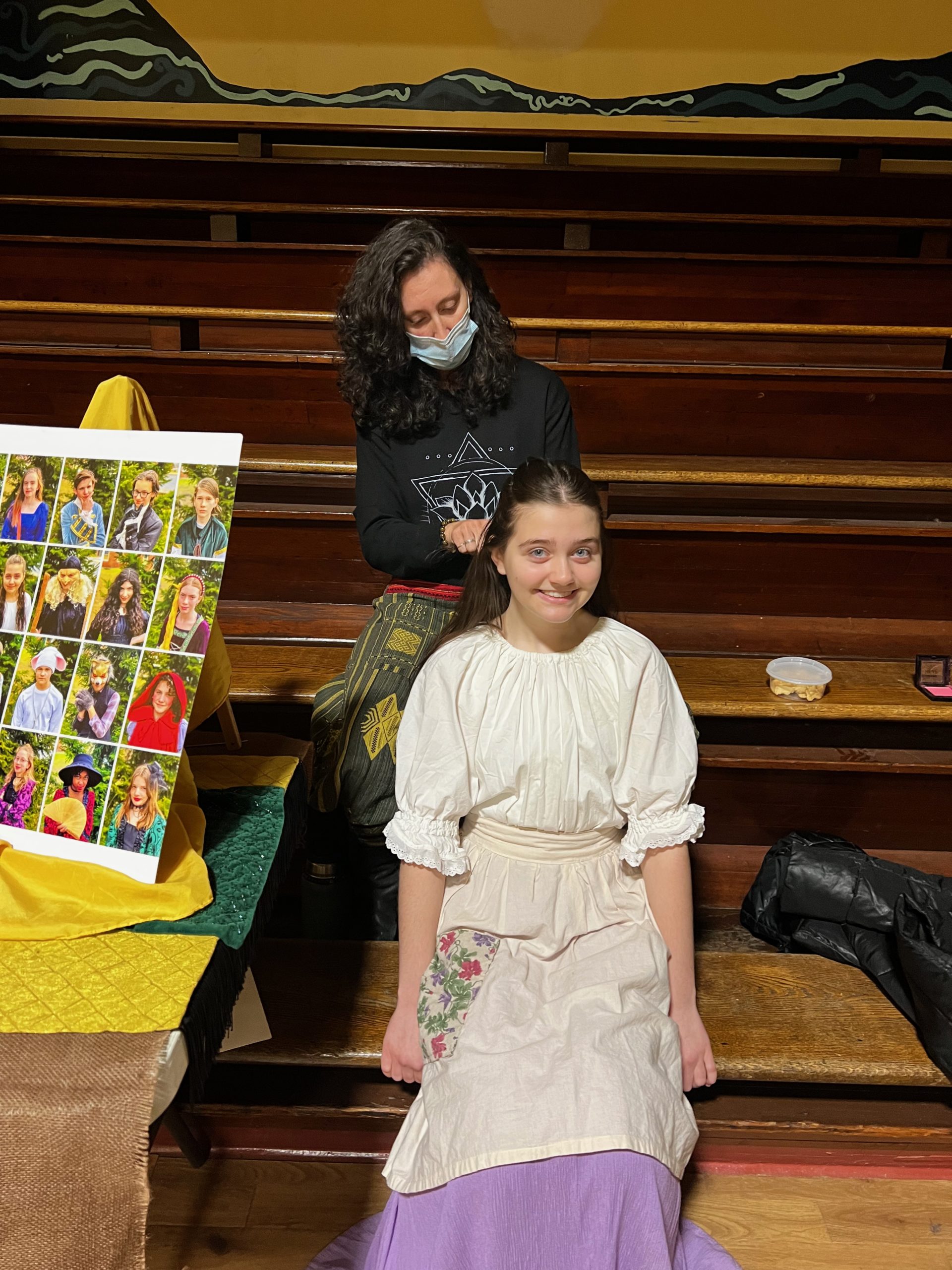

One could feel the nervous excitement in the air as students prepared for their first performance. Students warmed up their voices, received the finishing touches on their makeup and costumes, and the show was ready to begin! This was a very special performance as it was for their fellow Waldorf students. 1st through 6th-grade students eagerly filled the seats and soon the gym was filled with song, laughter, and amazement. Standing ovation! A 2nd grader was overheard saying, "that was better than any movie I've ever seen!!" as the show came to a close. The 7th and 8th graders were treated as celebrities as students gathered at the back of the gym to collect autographs. The 7th and 8th graders went on to perform three more times to sold-out houses!
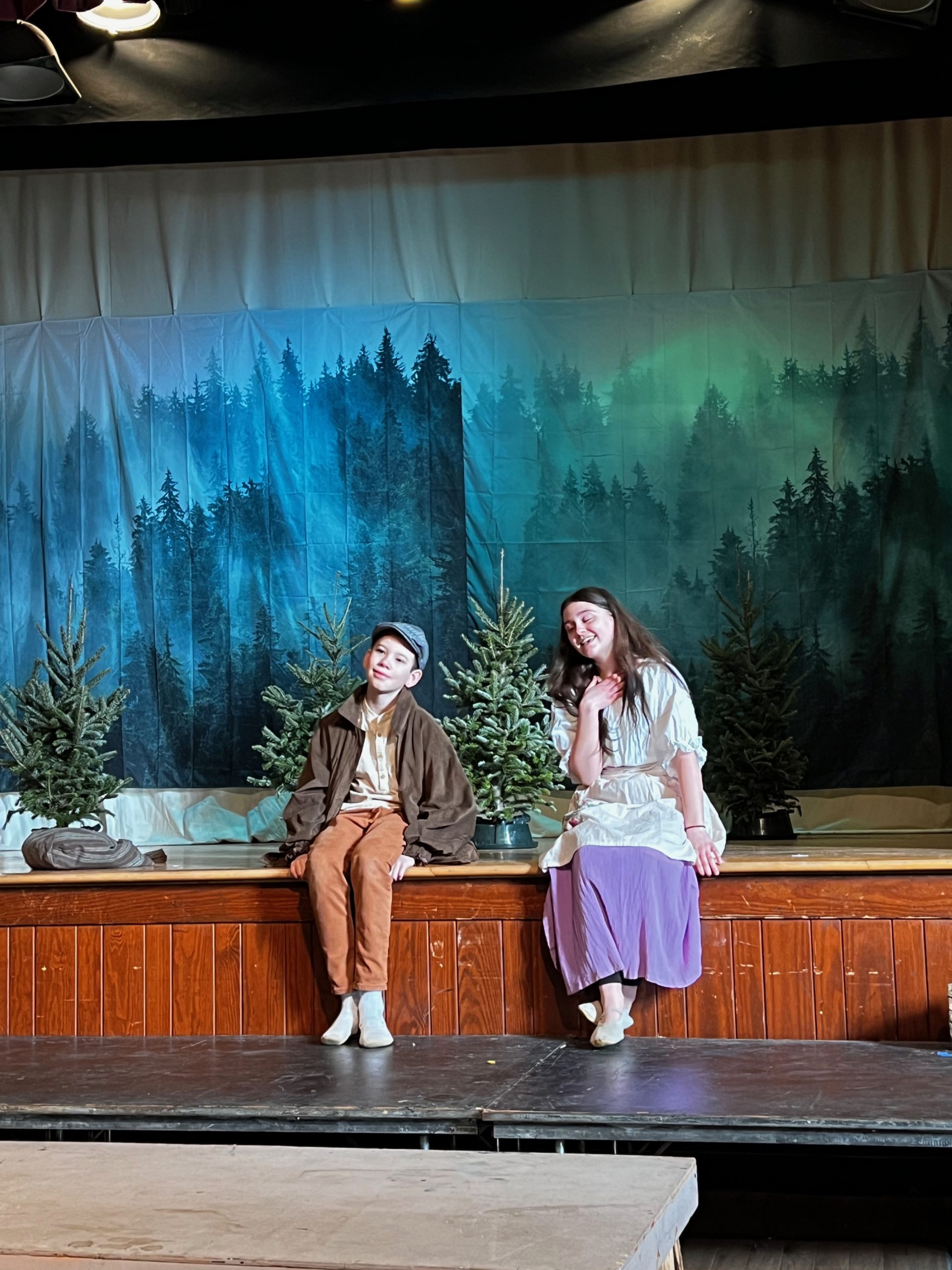

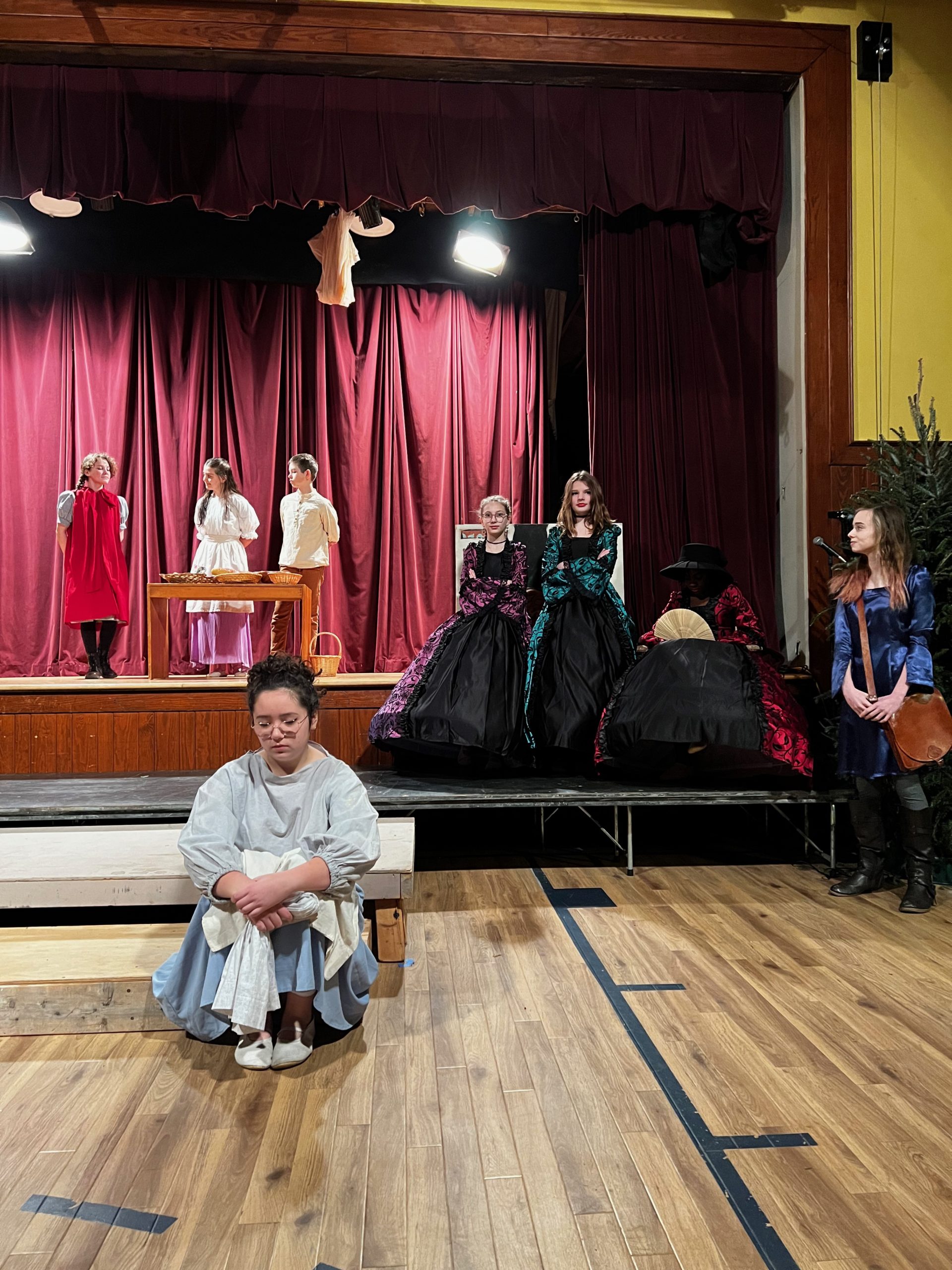

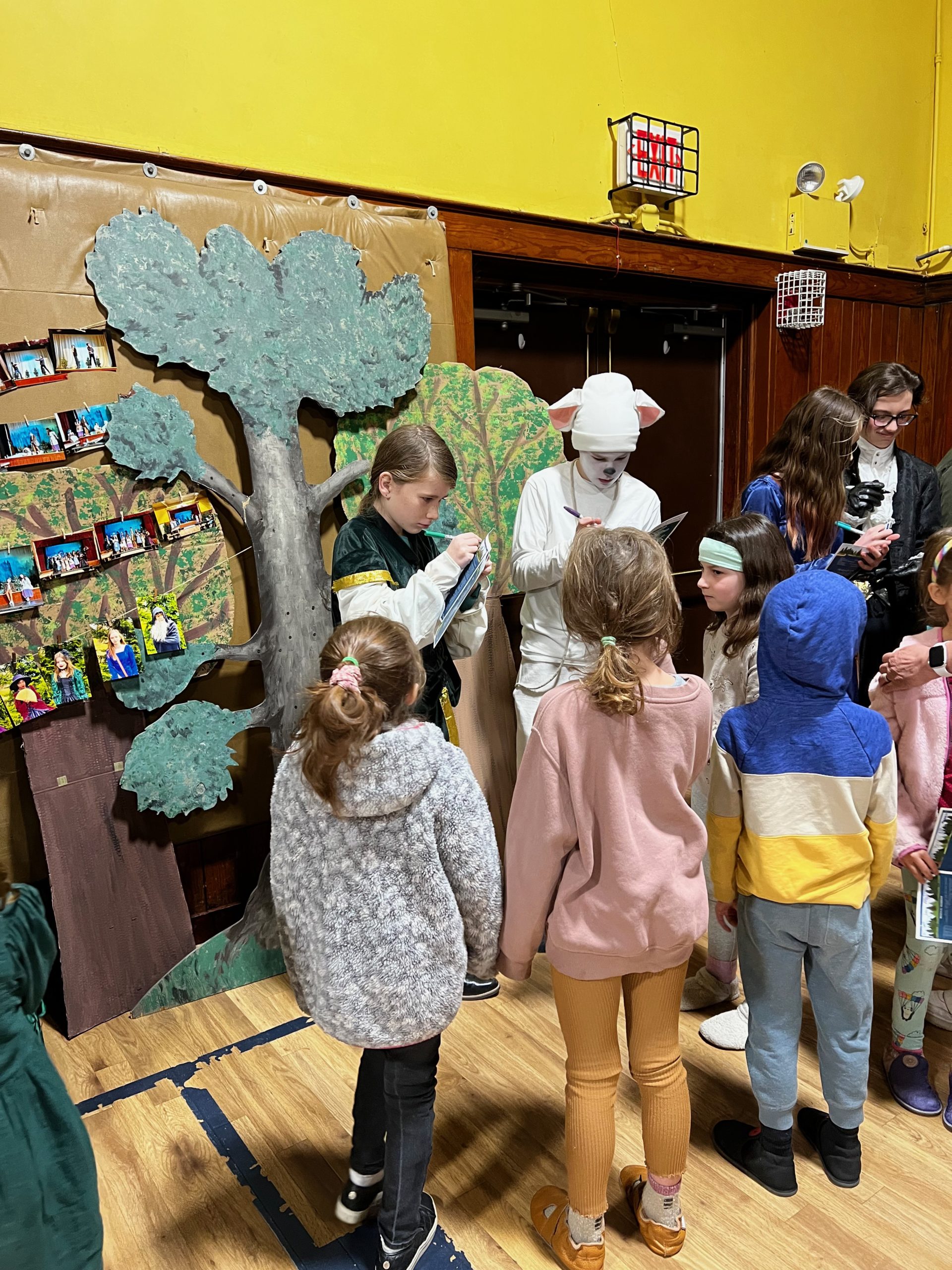

“And it came to pass, all that seemed wrong
was now right, and those who deserved to
were certain to live a long and happy life.
Ever after…”
Congratulations to all involved!! Special thanks to teachers extraordinaire Mrs. Dietz and Ms. Tucker for their hearts and vision; Mrs. Radanovic for all of her support along the way; Cody Smith for his expert choreography; Justin Badgerow for his excellent piano skills; Liz Pargament for her brilliant organizational support; and Andrea Huber for her skilled make-up and hair styling!
Works Cited: Glatt, Lawrence Joseph. "Why a Musical in Middle School?" School Renewal, Fall 20222, pp. 11.
SWS Community Highlight: Class Teacher & Alum Parent Melissa McIntyre
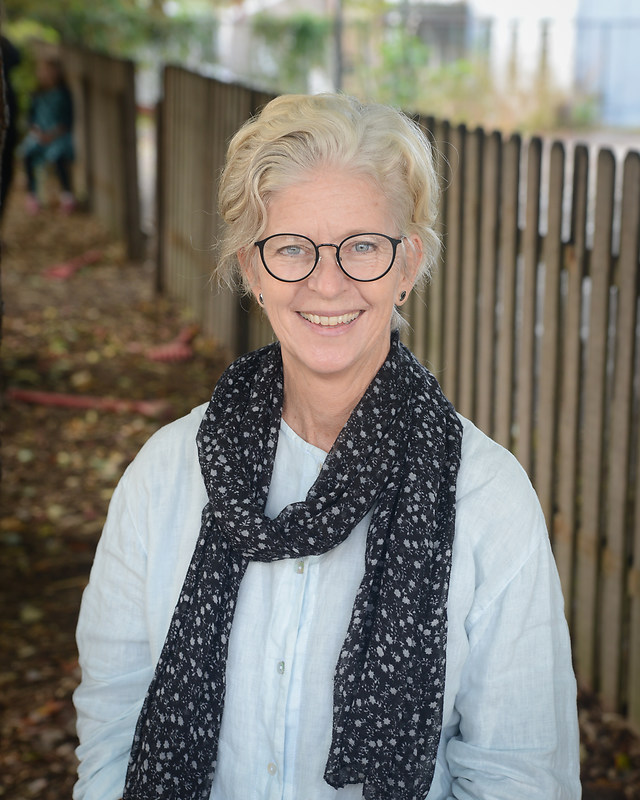

How long have you been teaching at SWS and what class are you currently teaching?
I just found out that it is exactly twenty years this month! I was hired as a kindergarten teacher in January 2003. It's flown by! This is my third time teaching 4th grade. I taught kindergarten for a couple of years and then there was a rising 4th grade that needed a teacher. My background was mostly in elementary education so I jumped in. That was my first class. I took them through 8th grade and then I went back around, took a class 1st through 8th grade and they graduated in 2019. I started with this class and now we’re in 4th grade. They’ll graduate in 2027.
What led you to Waldorf education?
We were a family down in Orlando, FL, we had three boys, and our oldest was starting 1st grade. He went to this lovely little public school that my husband was teaching at but he had 15 minutes of recess and 40 minutes of homework as a 1st grader. My shining, bright guy was becoming stressed out. A friend of mine said (she was from PA), "Melissa, you’re Waldorf-inclined!" At that time, 20-plus years ago, there were only Waldorf initiatives in Florida and there were none where we lived. My mom lived up here and we decided to make a big move. We visited PA during a December break, Jim had an interview in York city to teach, and we swung by SWS to tour the school. We knew immediately that we were coming here. It was that quick. We wanted this for our boys. I was a parent here for 2 or 3 years before I joined the teaching staff. All 3 boys were blessed to come through the school.
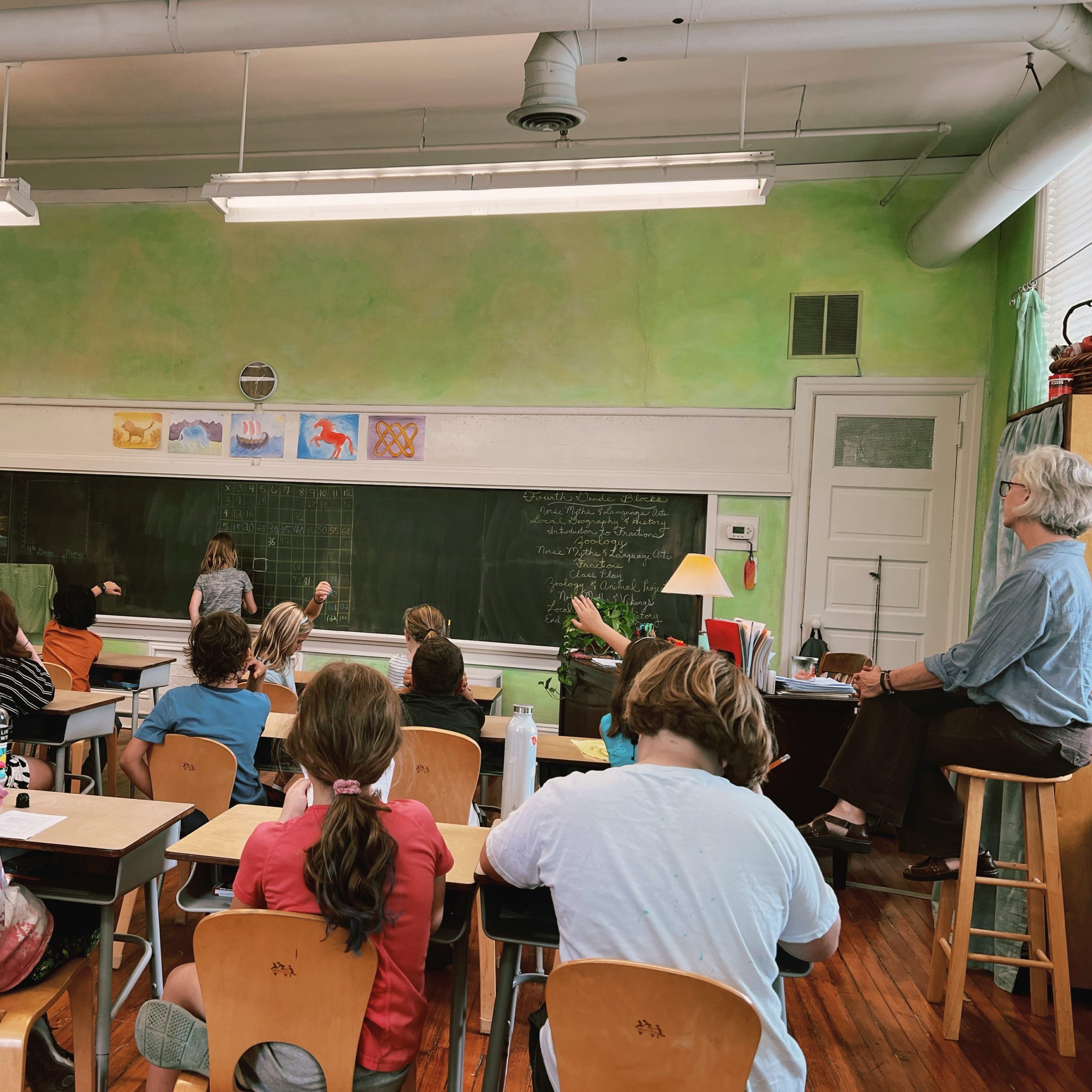

What’s your favorite part of being a teacher at SWS?
I can’t even begin. I think what I love, now that I’ve taken three classes through, is being able to see how each class has such a unique and amazing gift. I have learned from each of them. True gifts. And because each class is so different, I get to be creative all over again. I taught for seven years in public schools and, this was a long time ago, but it was pretty structured and I was only able to be creative in pockets. You know what you’re teaching with the structure and curriculum that’s given to us by Waldorf pedagogy, but, most importantly, you’re making sure that you’re meeting the kids in front of you. That form plus the freedom to make sure you’re meeting them is amazing.
What does it look like to meet your students where they are?
You know, there are times when I have something in mind and I look at them and can tell, “they need to move their math today, they don’t need to write their math.” Keeping it surprising for them. Especially in the winter, it’s really important to keep it fresh in other ways. There have also been numerous times when I’ve brought a lesson and I can sense how it interests them, so I changed the next couple of lessons to keep going in that direction. I make sure I meet all of their curiosities about a topic.
Another really important part of it is, as a class teacher, I have to keep growing with them. If I was the same 1st-grade teacher that met them this wouldn’t be working. I have to be aware, keep adjusting, and keep them guessing in some ways.
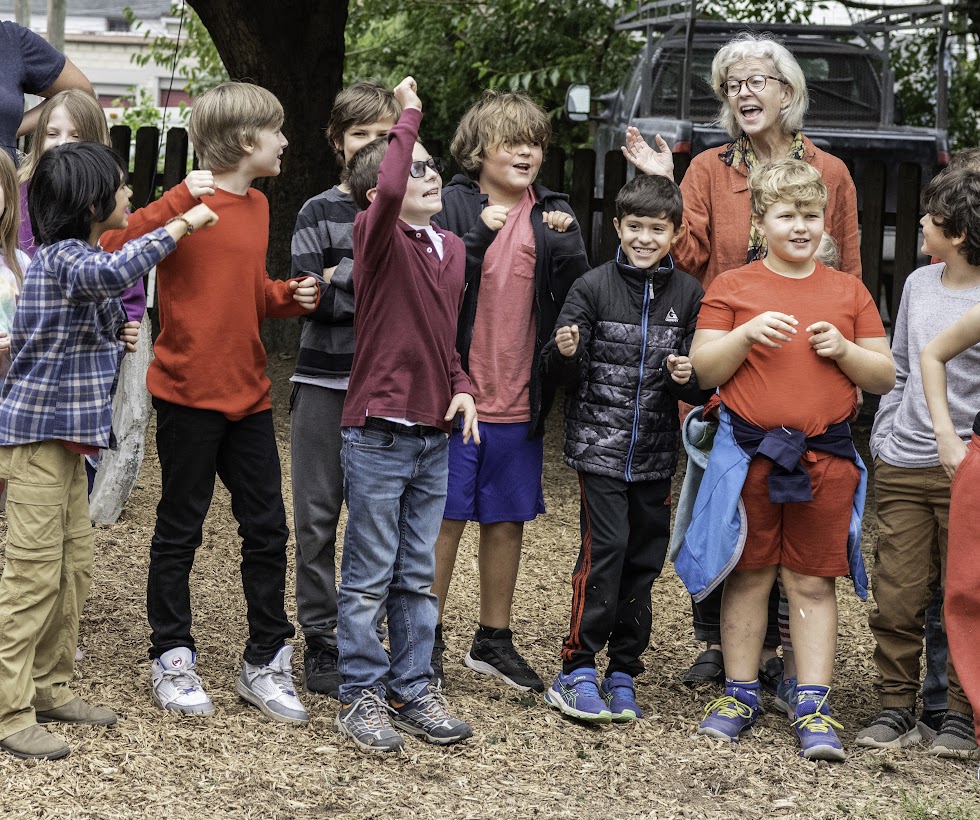

How has Waldorf education impacted you as a person?
I’m a work in progress. It’s a little bit of a catch-22 because when you’re a teacher and you’re before your students, you have to be so in the moment. And that is a blissful place to be, to be so in the moment, to be so attuned to what is around you. But it’s when you’re by yourself, you can get pulled into, “oh I gotta do this," or "I gotta do that.” I find that I have to work hard to be in the moment outside of the classroom. That is my striving: balancing. That is what Waldorf has brought to me. And I know, ultimately, that I become a better teacher when I’m truly trying to seek that. It is in the seeking.
As a parent, I'm so thankful. My oldest son went to college and had this realization that he was surrounded by people who were given messages early on that, “Oh, I’m not really a musician,” or “I’m not really artistic” and because of that, his peers, who were very talented, were pigeonholed and they would pigeon hole themselves. Because he came from a Waldorf background where everyone sews, everyone plays an instrument, everyone writes, and everyone’s in the play, he never got that message. He realized the gift for him was that because he experienced it all and everyone did everything, he never saw himself as not being able to try things. I’ve heard that echoed from all three of them. Because they were open to many things, they all landed in areas as adults that they’re really happy with and that they’re excited to go into further. As a parent, seeing that your children are happy in their adult lives with what they’re choosing, I mean, that’s it. Happy people. That’s all you want.
What's your favorite thing to do when you’re not teaching?
Good books are awesome. They’re an amazing escape. Spending time with my granddaughter. When the weather’s right, we love being outside. Biking and kayaking are biggies. Those are our favorite things: our granddaughter, biking, and kayaking when the weather’s good.
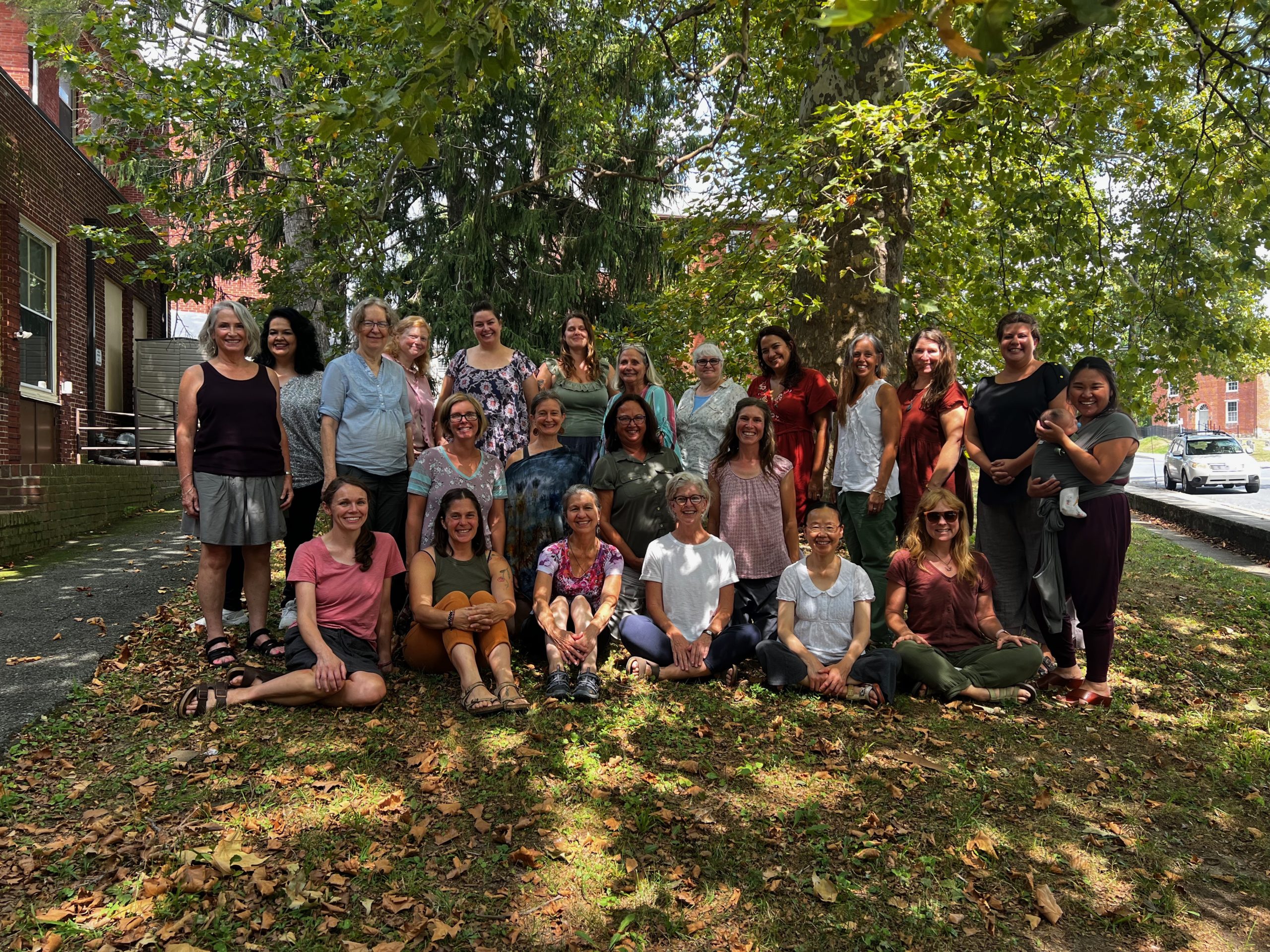

What’s your favorite thing about our school’s community?
So, again, I get so teary about this. With every class’s parent group, there have been gifts that I’ve received. With my colleagues, just knowing that we’re all striving. We have our good days and bad days and knowing that our paths don’t look the same in how we’re striving but having honor and grace in that. When we talk about our professional development, that’s high up on our list, “how are we working on ourselves?” People check their egos here.
Every day I’m just so thankful to come to a place where people are striving to do the best they can as humans working together. And also humans working around children. The parents do it every single day. Every time we come together to talk about their child or the class, everyone comes from their higher selves. That’s just awesome and that’s why the classes are as they are. That’s why the children are humming here because of the adults around them. That is just top-notch. We are here for these kids and the result is just this amazing environment that nurtures and holds these children and they feel it. Every day.
Celebrating the Chinese New Year at SWS
Written by SWS Mandarin teacher, Hui-Ling Singer.
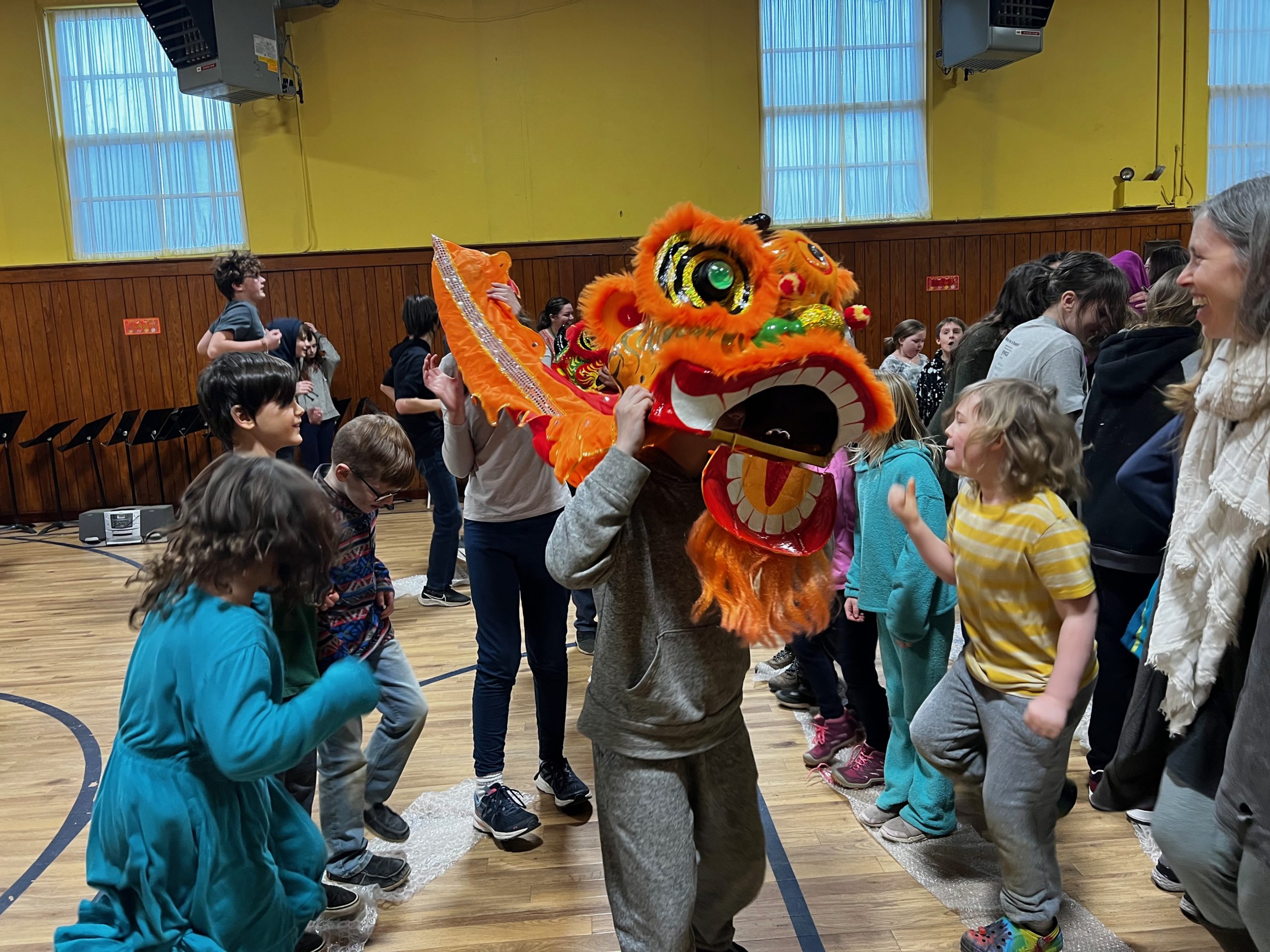

Chinese New Year is one of the most important Chinese Festivals. It celebrates the beginning of a new year based on the lunar calendar as opposed to the Gregorian calendar, which is the solar calendar used here in the USA. The first day of the Chinese New Year begins on the new moon which usually takes place between January 21st and February 20th on the Gregorian calendar each year. This year the Chinese New Year happened on January 22nd. Last year in 2022, it was on February 1st, and in 2024, it will be on February 10th. The Chinese New Year celebration lasts until the Lantern Festival which is January 15th on the lunar calendar and February 5th on the Gregorian calendar this year.
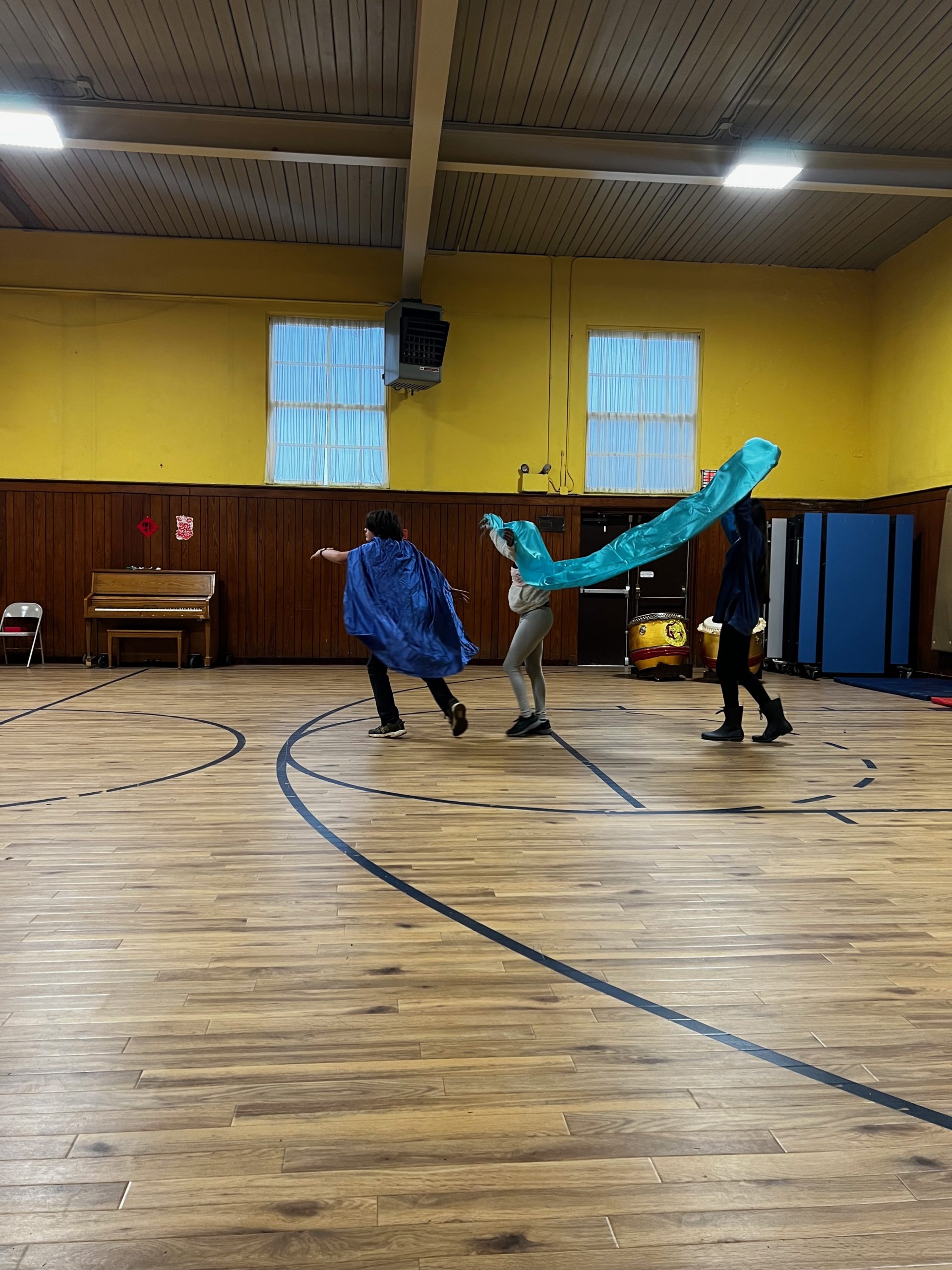

I feel very blessed to be part of the Susquehanna Waldorf School community that honors different cultures and all walks of life. Thanks to the support from our Leadership Council, DEI Committee, and the whole school, this year we were able to hold a very special assembly on Friday, January 20th to kick off the celebration for the New Year, the year of the Rabbit. Class 5 & 6 started the celebration by telling the legend behind the Chinese New Year, an Animal Called Nian (Year), followed by the very popular New Year Song from Class 7. A special moment was dedicated to Class 8 when the students received their Chinese names.
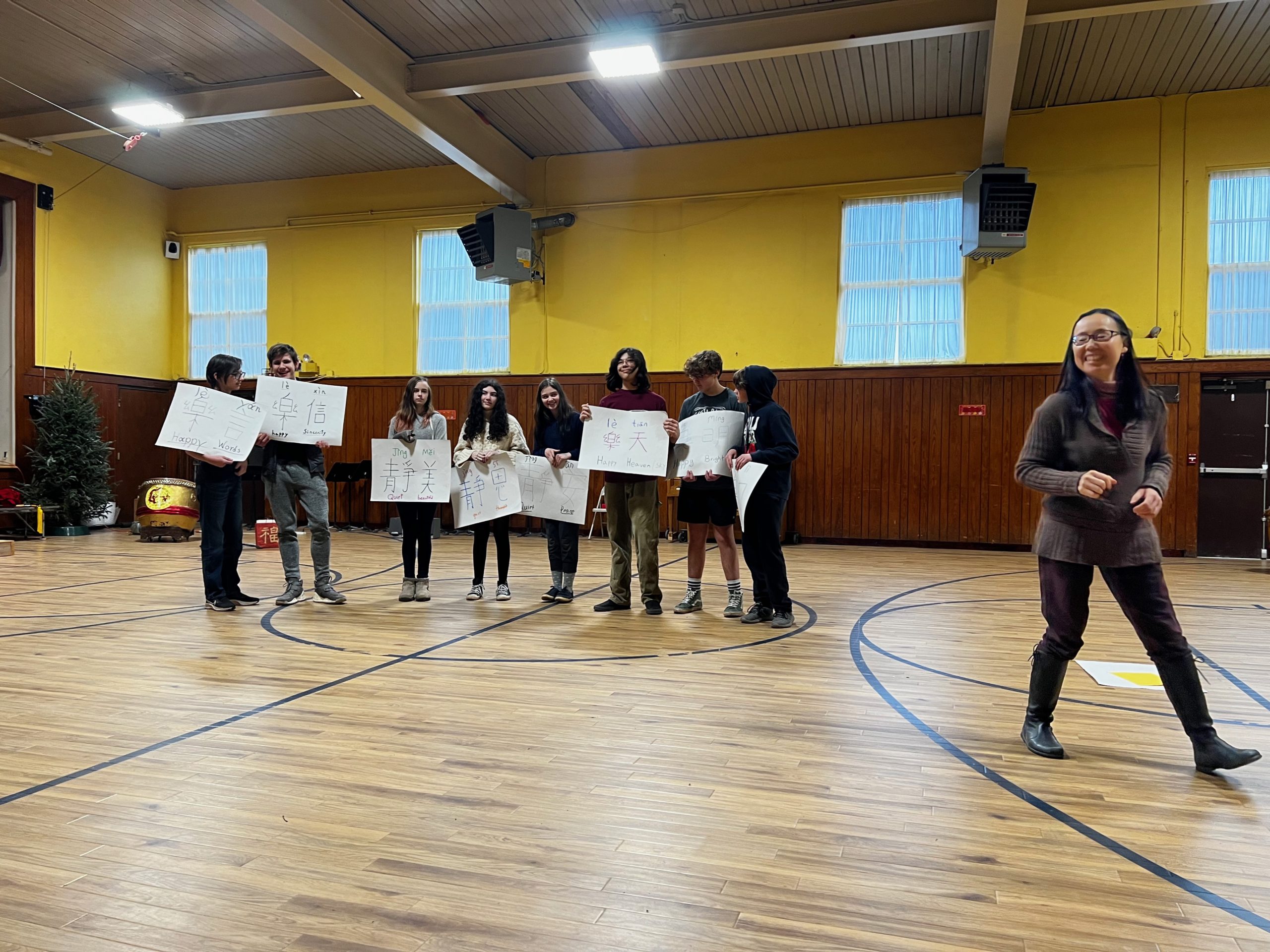

The highlights of the celebration were the Sword Dance and the Drumming performance by Kevin Chen, William Hinkson, and Rylee Hecht from CCAI (Chinese Cultural and Arts Institute in Harrisburg). The Sword Dance was the favorite for most of our students. The celebration concluded with the whole school jumping on the bubble wraps representing the sounds of the firecrackers, the Lion parade, more drumming from CCAI, and the students receiving the red envelopes with a dollar coin from Taiwan inside at the end. Special thanks to CCAI founder, Chen-Yu Tsuei!
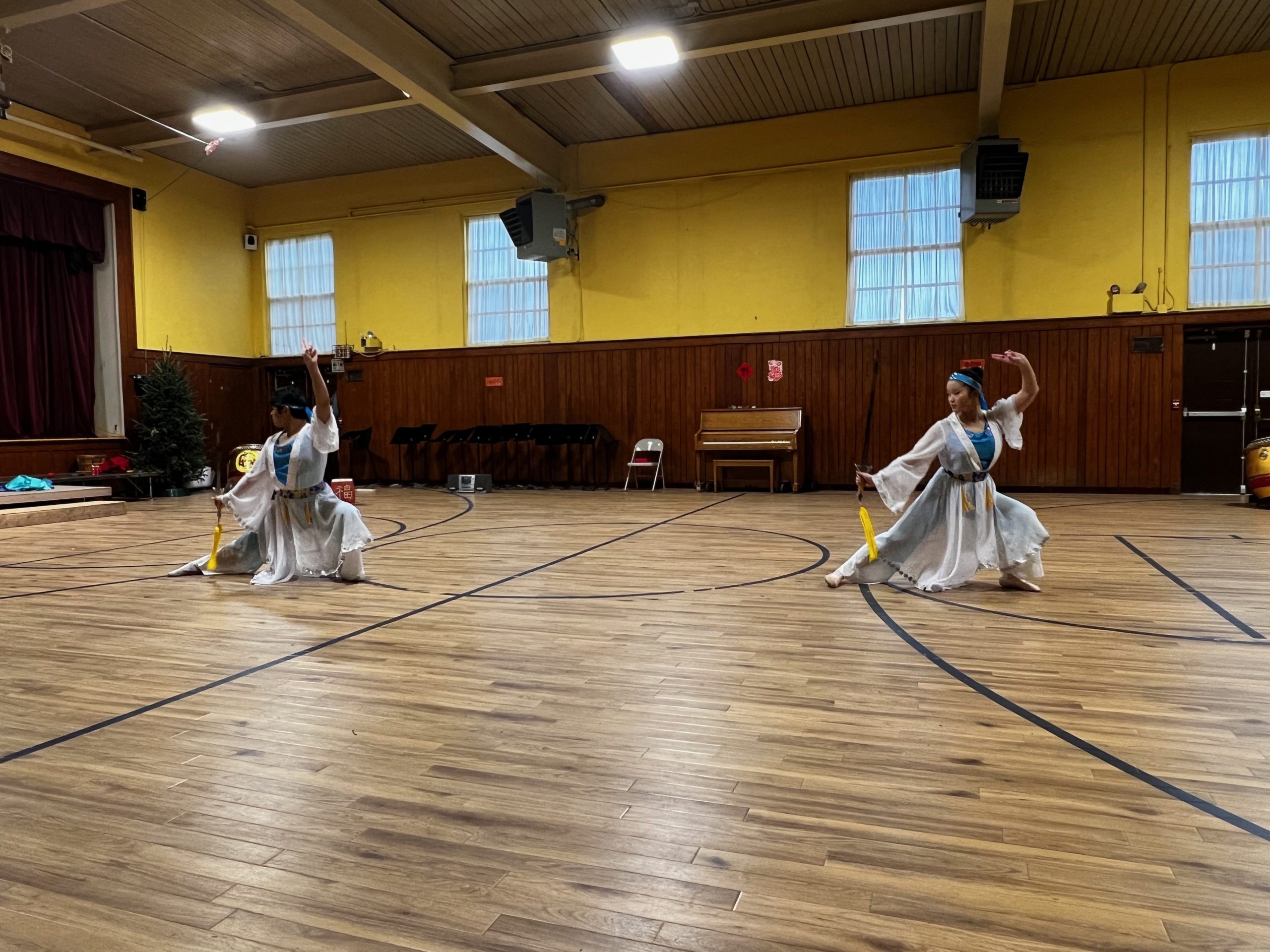

In addition to the Chinese New Year Celebration assembly, various cultural activities were also shared in each classroom. For example the story behind the 12 Chinese Zodiac Animals, paper cutting, lion head coloring, lantern making, and riddle guessing for the Lantern Festival, just to name a few. Some special Chinese New Year’s food was also shared, including Chinese New Year’s Sticky Rice Cake (see below for the recipe), dumplings, vegetable spring rolls, and mandarins. May the year of the Rabbit bring you and your family good health and lots of joyful blessings!
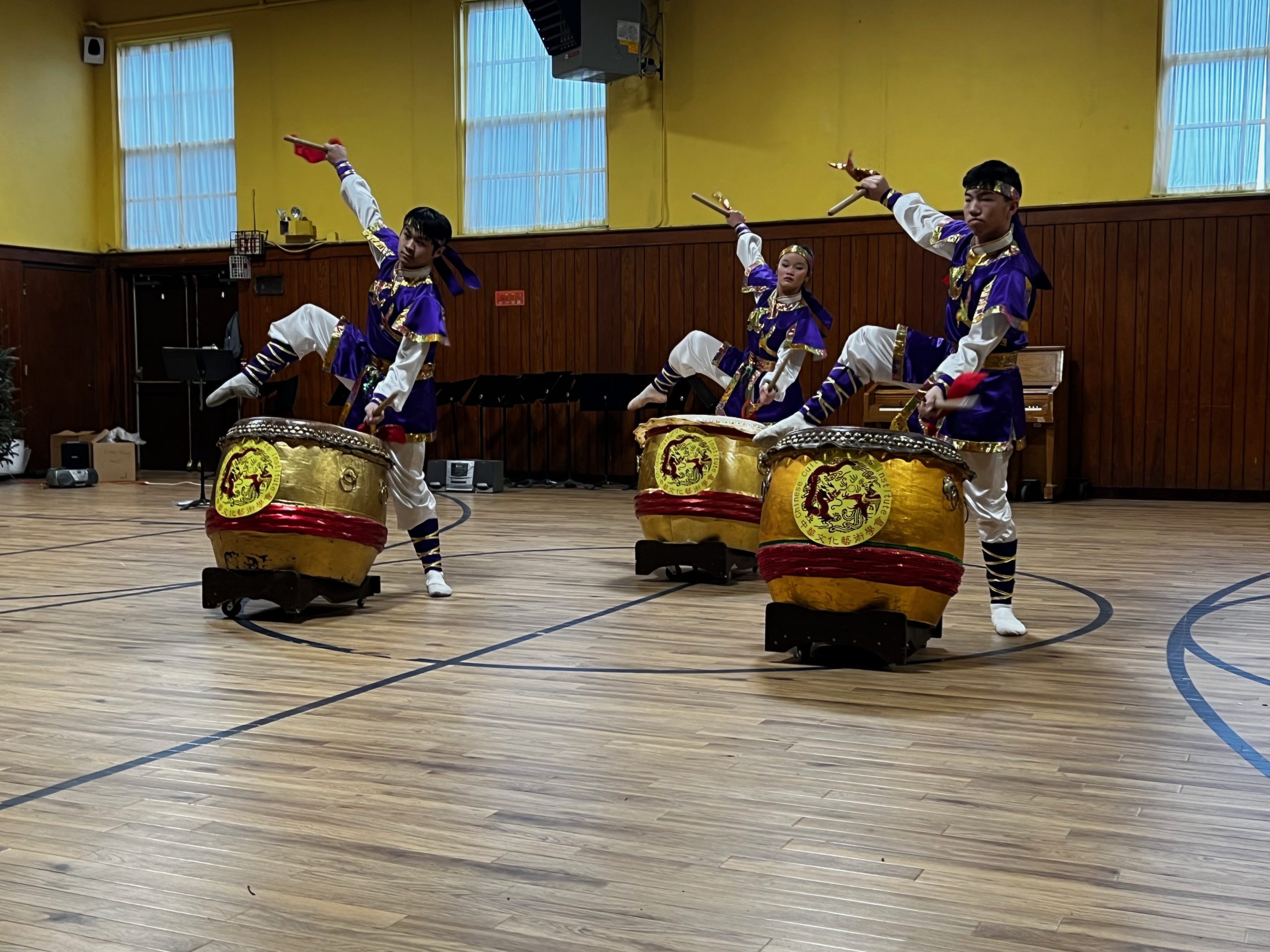

Chinese New Year Sticky Rice Cake Recipe
Chinese like to eat 年糕 (sticky rice cake) during the Chinese New Year. 年糕is pronounced “Nian Gao”. 年(nián) means “year” and 糕(gāo) means “cake”. 黏means sticky also is pronounced “nián”. 高 means high, tall or above the average is also pronounced “gāo”. Therefore, 年nián 糕gāo (sticky rice cake) is to symbolize this year will be better than last year.
Enjoy making this simple Chinese New Year sticky rice cake recipe and enjoy the 年nián 糕gāo! May the rest of your 2023 and the year of the Rabbit bring you and your family good health, lots of joyful blessings and loving memories!!!
1 lb glutinous rice flour (can be found in any local Asian markets)
3 eggs
¼ lb butter (room temperature)
2 cups sugar (I usually use a lot less, but you can follow the recipe the first time and adjust it later.)
1 tsp baking powder
1 tsp vanilla extract
3 cups milk (any kind of milk will do)
½ cup shredded coconut (can be eliminated if you don’t like coconut)
Mix the butter and sugar. Add the eggs and milk and mix well. Add the rice flour, baking powder, and vanilla extract and mix well. Add the shredded coconut and mix well.
Pour the mix into a greased 9”x13” pan. Bake at 350 degrees for about 50 to 60 minutes or until the surface turns golden brown. (Your kitchen is going to smell so good.)
Stepping Stone Nursery: From Garden to Table
Written by Stepping Stone teacher, Tabea Steinbeisser-Fitz
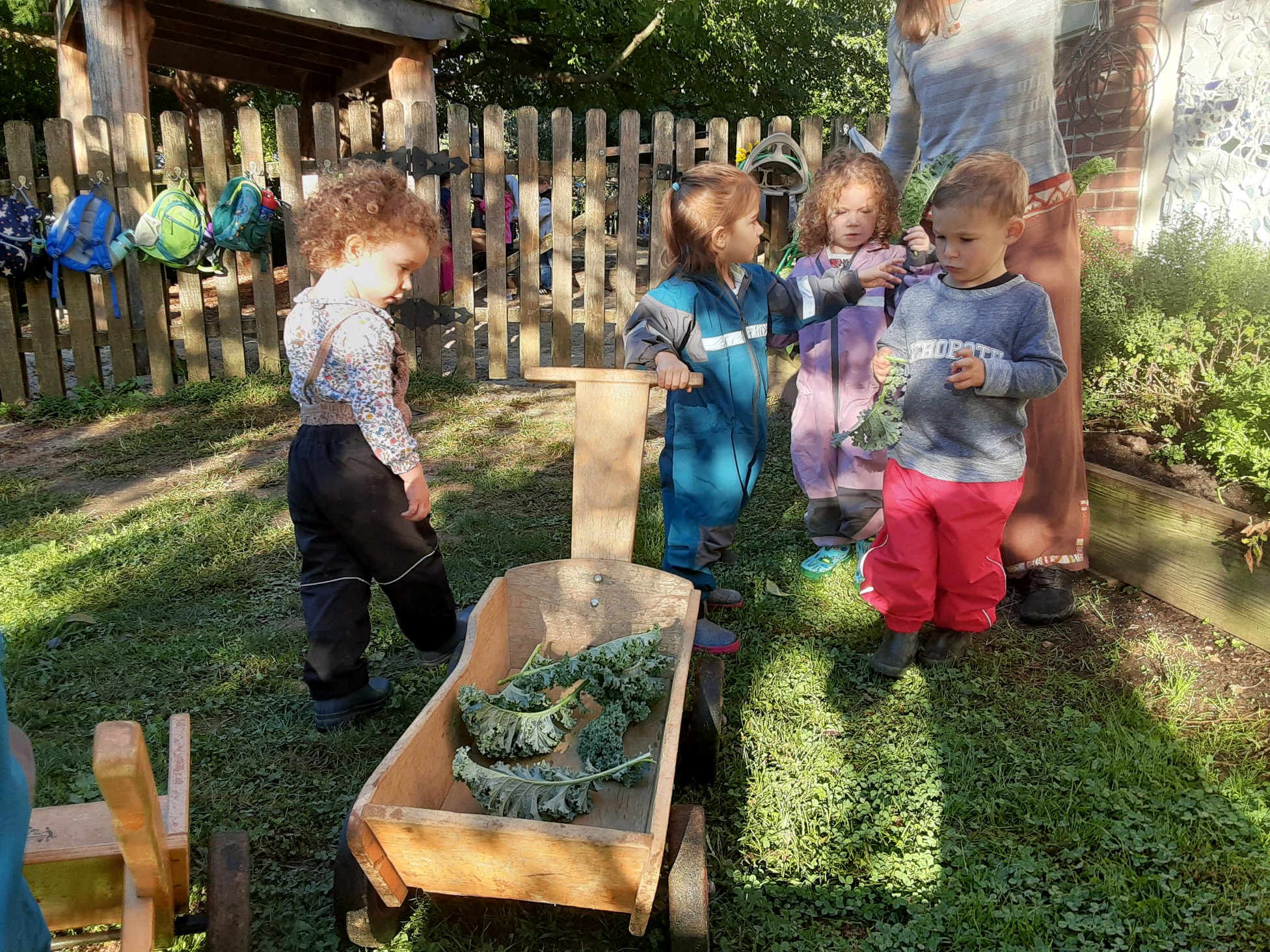

When the Stepping Stone children planted their vegetable garden last spring, we had no idea we would create a whole new menu in October. Thursday’s beloved snack is made with our homegrown baked potatoes, kale chips, and peppers topped with fresh parsley!
In the back row of our 3 garden beds, we planted mums in all kinds of colors. The children were busy planting potato seedlings, young kale, pepper plants, parsley, and marigolds for silk dyeing in early spring. The children loved when we got the watering cans out. Not only did the plants get a good soaking, but the children did too. We weeded and were delighted when we found worms and bugs.
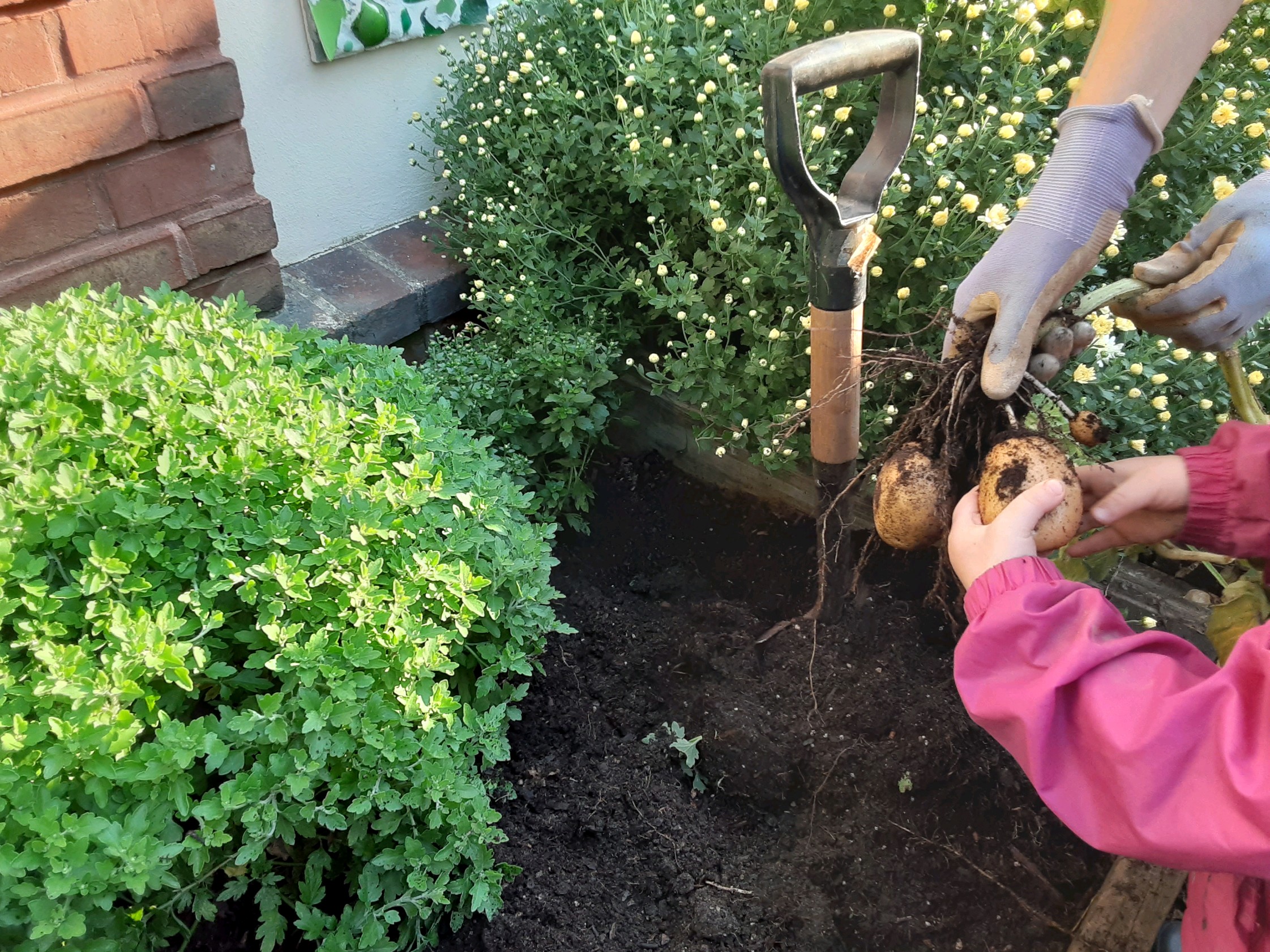

After a long summer, we returned to find tall and mature plants, ready to be harvested. And harvest we did! From digging up a big crop of golden potatoes to weekly picking of kale and orange peppers, we eagerly tended to our garden. We loved picking mums and marigolds and made beautiful bouquets for our office staff and front desk. The marigolds made a deep yellow dye for our “Golden Capes of Courage” at Michaelmas. All this work filled us all with purpose, joy and gratitude for Mother Earth.
We held a Thanksgiving feast in November with everything we could find in our garden. The children brought herbs, flowers, seeds, and vegetables from their gardens at home. We gathered around the nicely arranged, full harvest table and touched and smelled the different herbs and flowers. We said a special gratitude prayer to Mother Earth for feeding us so well.
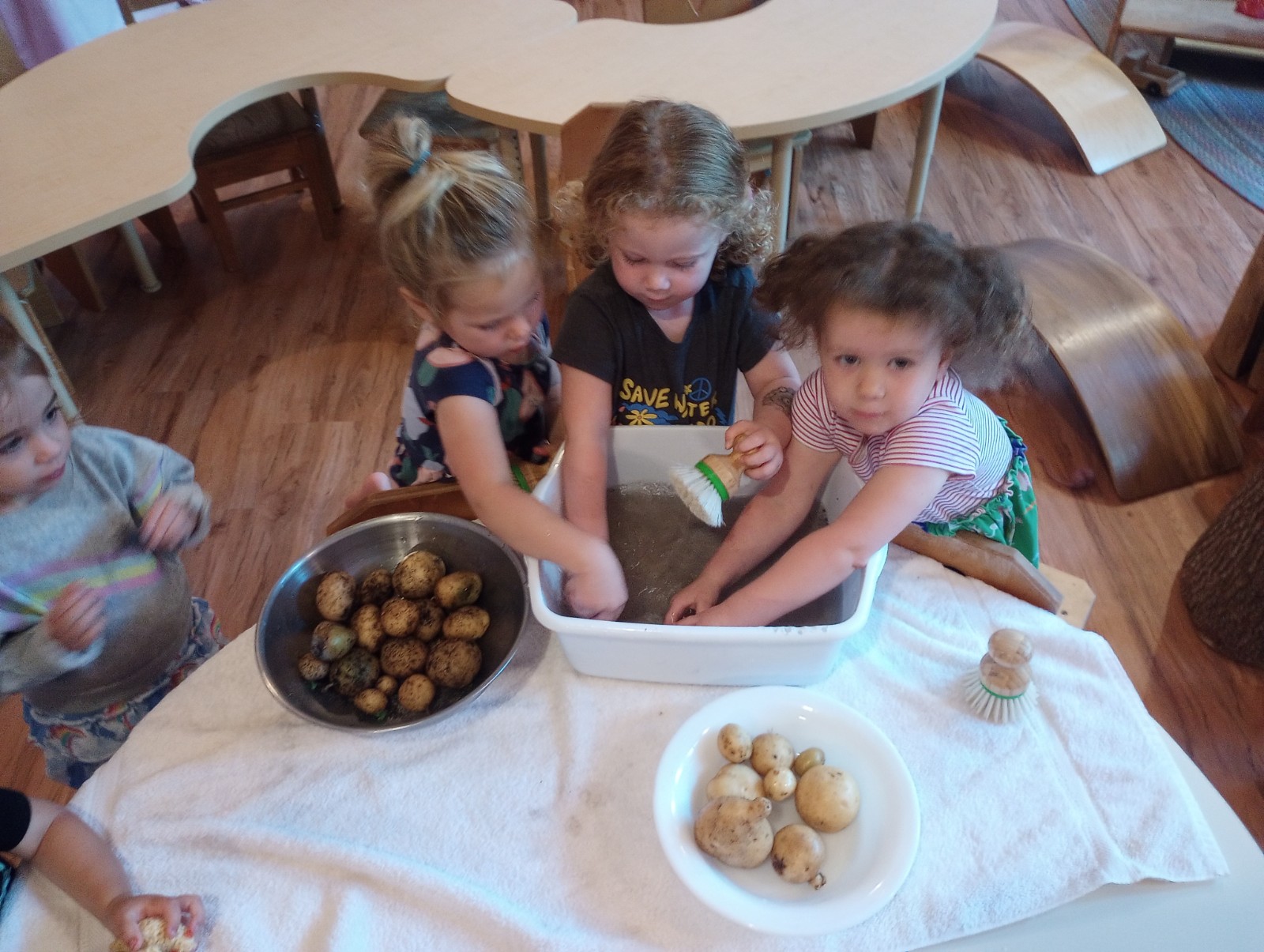

There is nothing more tasty and rewarding than making a meal from our own garden. It begins with harvesting and continues with scrubbing potatoes and washing kale leaves. This is work the children very much love (anything with water is great fun!). The smell of the baked potatoes and kale chips even drew some visitors to our classroom. To our amazement, our homegrown vegetables lasted until almost Christmas!
Thanks to a skilled parent who built and installed a beautiful new garden box and the class parents who donated spring bulbs, we engaged in a new garden project: creating a spring garden. The children helped to plant each bulb and cover it with dirt with great care. We were busy shoveling mushroom soil into the new garden box for weeks. It was a joyful task for all. We look forward to spring and we're excited to learn what kinds of flowers will grow, and how they will make our playground a more welcoming, colorful, sweet smelling, and beautiful place.
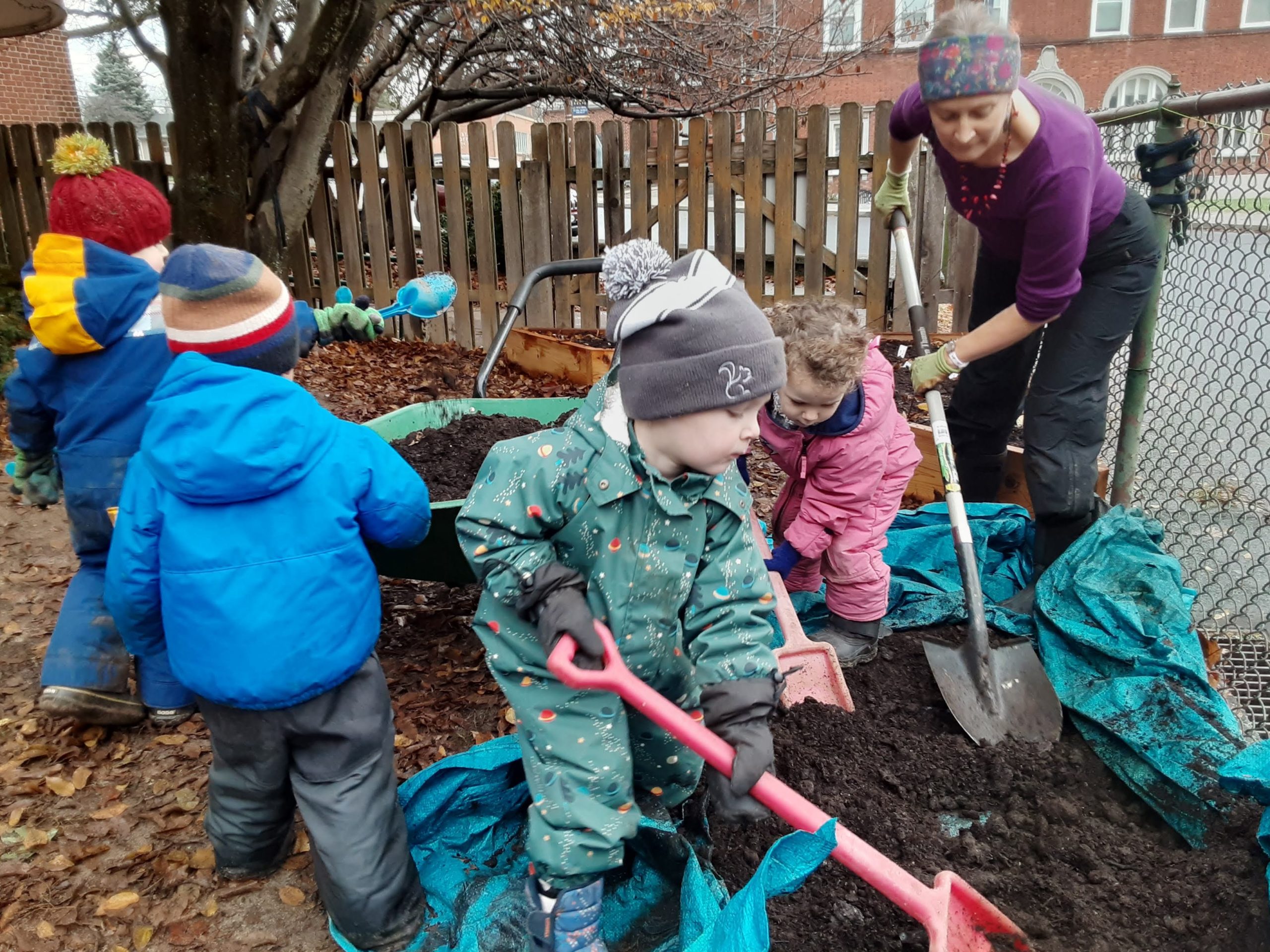

It fills my heart with deep joy and gratitude to be able to live off of our own garden, participate in and witness the seasons year-round, and be nourished by the gifts of the earth. Likewise, it calls each of us to take care of what is given to us, to become participants and stewards of our gardens, and to appreciate the hard work of farmers and gardeners all around the world. It is a blessing to share this work with the Stepping Stone children.
35th Anniversary Spotlight: Alum Parent and Board President Dave Knapp
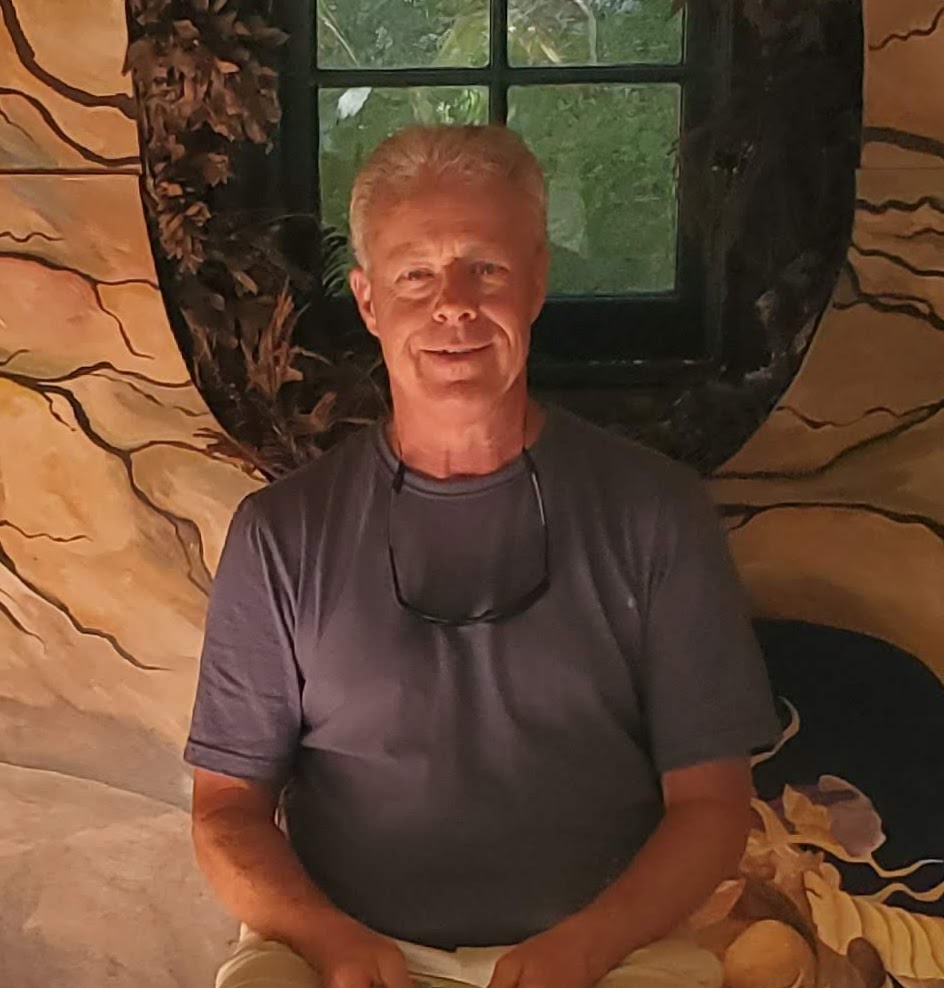

What led his family to SWS...
My children are Tim and Mike and they graduated in 2001 and 2004. Tim was in the first class to go to 8th grade. They attended preschool through 8th grade. They were at SWS as long as they could be.
We lived near SWS and my wife was participating in a breastfeeding support group and she had heard about the school there. She suggested it to me and I asked, “why would we want to go to a private school?” We had both gone to public school and did fine. I had concerns about how to afford the school. Then we came to an open house with Miss Linda and Boel Neville, both of whom are organizers of the original school. They just swept Tim into the room and embraced all of us. I was enchanted. Even as a guy who wasn’t easily enchanted at that point in my life, I was like “wow, this is pretty special.” Those two teachers were very special. There was a tangible welcomeness to the school. I remember the feeling that my child felt comfortable. He’s not someone that jumps in, he’s a watcher. He just got swept into it and was comfortable from the beginning which was very impressive to me. It really hasn’t changed. It’s only gotten better.
What made your family decide to stay through 8th grade?
Miss Linda was Tim and Mike’s teacher and the first student report that we received was incredible. She knew him better than I knew him at that point. It was so clear that she was completely aware of who my child was. That just brought tears to my eyes. I knew he was in the right place. Kindergarten was the next step and just as good. It wasn’t even a question after that. We just knew they were in the right place.
How did Waldorf education impact your children?
Tim is an architect in Philadelphia. The art part of Waldorf education really contributed to that. He’s a really talented person in terms of being able to design buildings. Mike is a senior managing director for a consulting group and he lives in Austin. I think people wonder about Waldorf schools, like reading and math. Well, Tim's an architect and Mike was a business major. They were both academically and socially ahead of their peers in high school. They both went to good, independent colleges. Colleges love Waldorf students. Every admissions director I talked to said that was a bonus on their resume. What I'm most proud of, though, is the kind of human beings they are. They’re really good people in addition to having good jobs. I feel really proud and happy that this school helped get them to that point. I think our kids help the world.
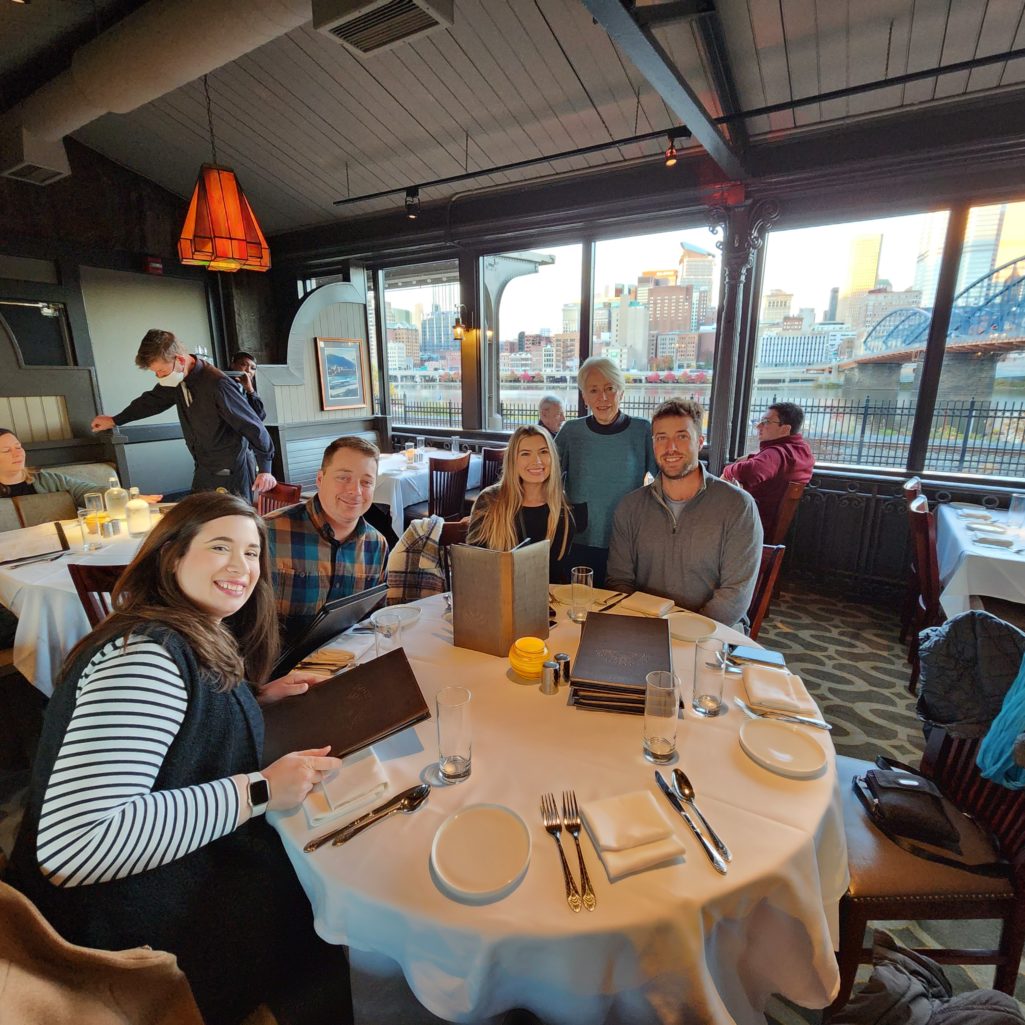

How did SWS impact you as a parent?
It really had a profound effect on me and only in hindsight can I see it. No one is taught how to be a parent. We have role models. Good or bad depending on the family. I was fortunate to have good ones but in this case, we also had the role model of our school. I often say that this school has been as important to me as it’s been to my kids. And that’s high praise because it’s been spectacular for my kids.
I got involved in the board probably 2 years into my children being students. I was board president within a year after that. It was my first experience really giving to something. I found volunteerism at SWS and that has completely changed my life. The greatest gift that anyone can ever receive is the gift of giving. I’ve come to really believe that. I think part of the success of this specific school is that you have involved parents. Raising a child takes a community. It takes a village. The participation of parents helps the students, helps the teachers, and it also helps the parents. By participating, parents learn how to be better parents. I was fortunate that I was encouraged to be on the board here and grateful to have been invited back last year. The school has made me a better parent and a better person. The community supports our children and our parents. The school and the children are better for that.
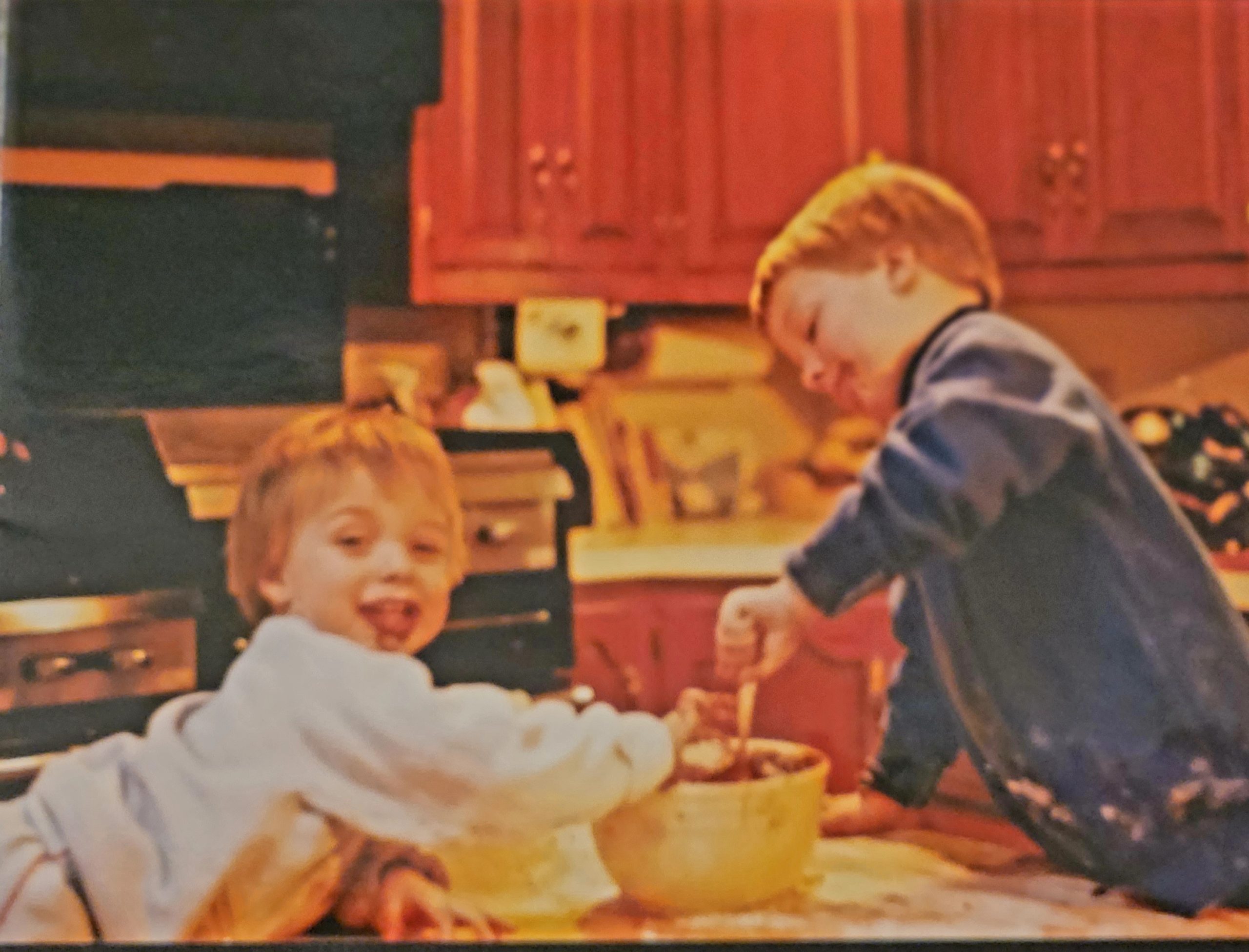

What makes SWS special?
I’ve often said that the single greatest thing we can provide for our children is self-confidence. If we can show them how to believe in themselves, all is possible. I feel that both of our boys have that. I think Jen and I helped to provide that, they came with that out of the womb, but SWS supported and nurtured it. I liked the way Lili put it: that every part of SWS (teachers, staff, parents) all support our children to become the best person they were meant to be. I also think critical thinking, learning how to work together, and believing deeply in themselves is crucial. We live in a world that is focused on separation and not working together and this school is all about working together. I think that we’re literally sending kids out into the world who can make the world a better place.
ALMA (Soul) of the Language
Written by SWS Spanish Teacher, Fernanda Brito-Muñoz.
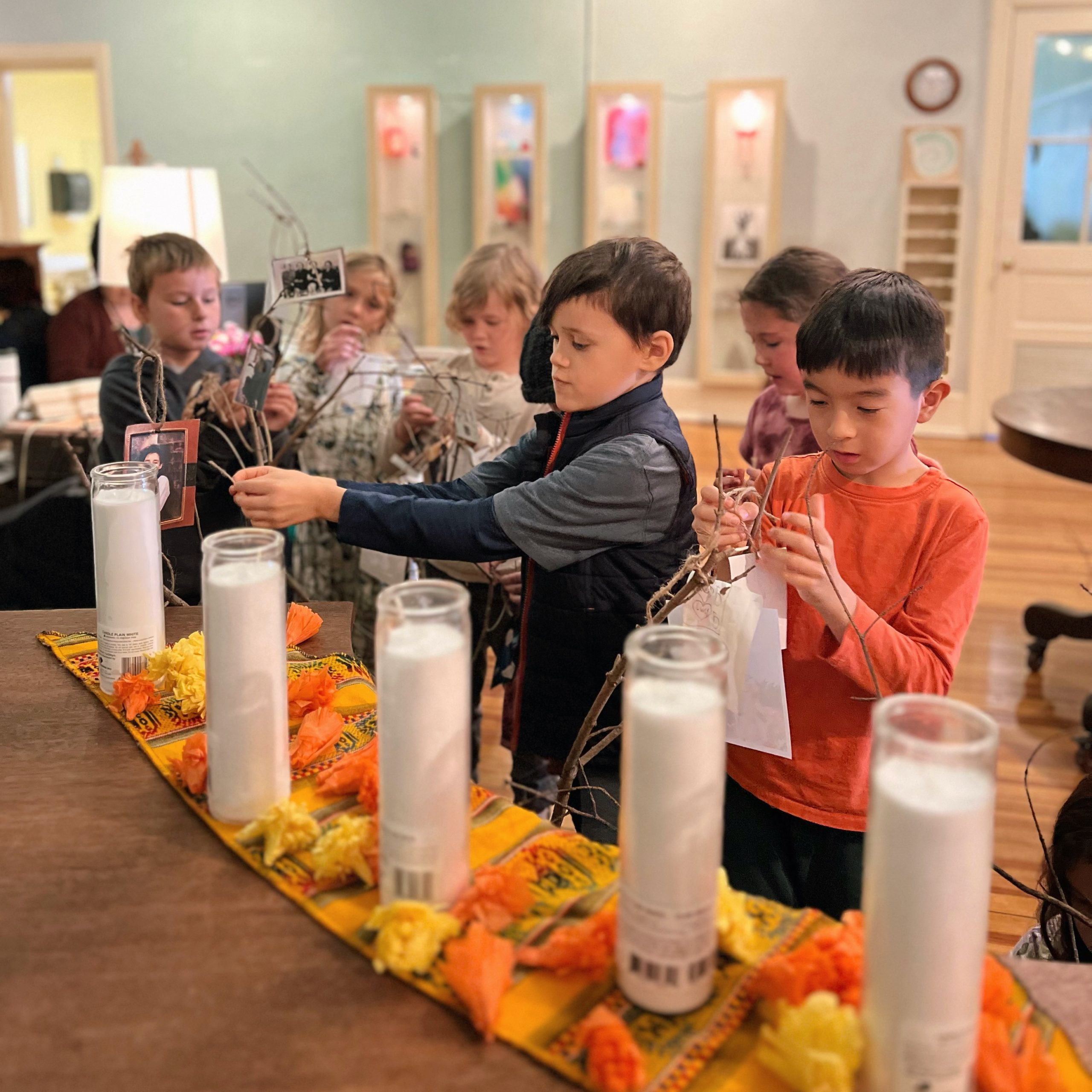

As I often question the purpose of things, I think about my role as a teacher of language. We all know that brain development is enriched when we learn a new language, but why is Spanish so important? It is crucial as my mother language, but why do young children benefit from learning Spanish? An article from 2019 declares that Spanish is the second language most spoken in the world after Chinese. Our students at SWS are very lucky to get both languages in their education beginning in first grade. Spanish has native speakers in over 44 countries. The most important thing to me is to help children and the entire community to see how, when we open our minds, we can realize that people that speak other languages are as smart, unique, and intelligent as English speakers.
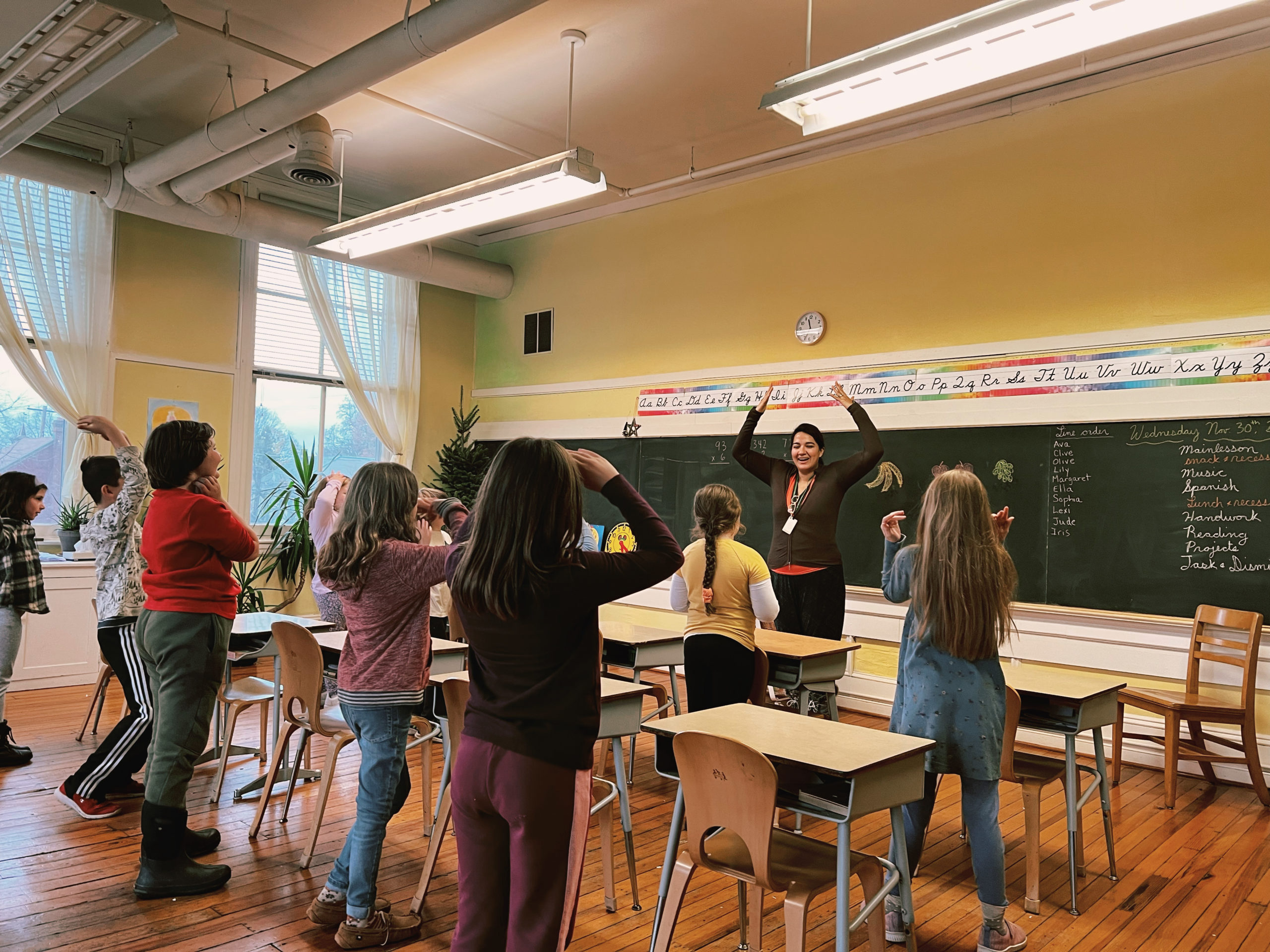
"Learning another language is not only learning different words for the same things, but learning another way to think about things." - Flora Lewis
I teach more than the language as vocabulary and memorization, but also the culture. This way students can understand the language as a way of thinking and open their minds to different cultures, making this world more inclusive and diverse. That is why Oliver Wendell Holmes, Sr. said “every language is a temple, in which the soul of those who speak it is enshrined.” Even for me, when I am speaking in English, I feel as if another soul is speaking that is different from when I speak my own language. I feel my inner child flourish. That is why it is so important to learn another language at an early age. This way the language seems natural and becomes part of your whole personality.
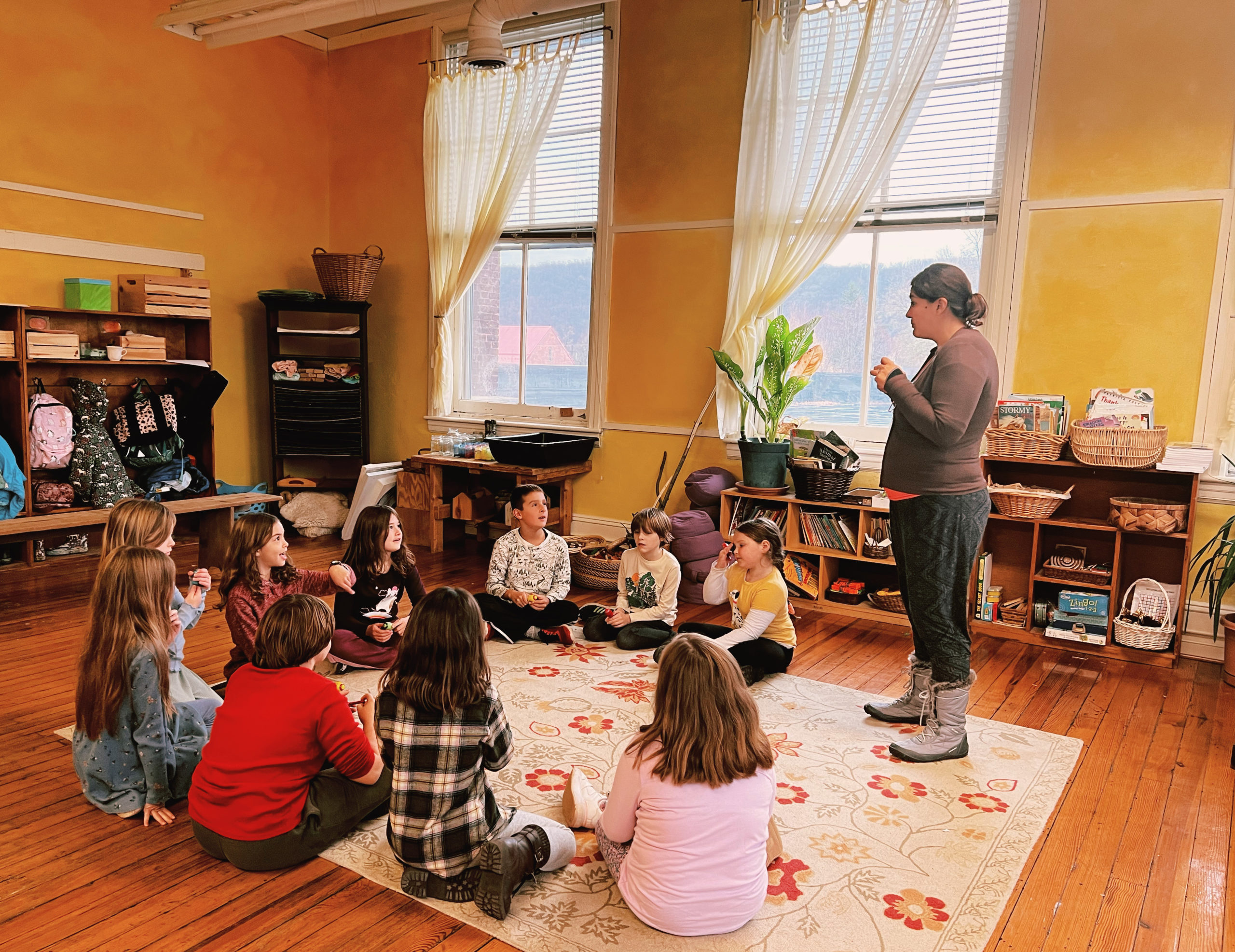

“Each language penetrates us differently and reveals human nature in a different way, which is why we must complement the effect of the mother tongue with other languages.” - Rudolf Steiner
As a teacher I am giving all of who I am, with all of my culture, traditions, and history. When I am teaching colors, gratitude, and happiness, I give others a piece of myself through exhibiting these characteristics, my culture, and all of who I am. Given that Spanish speakers are the 2nd largest population in the United States (Mexico has the largest), and projections suggest that by 2050, 1 in 3 people will speak Spanish (including bilingual people), I feel a great responsibility and honor to teach my language.
https://www.thoughtco.com/spanish-language-facts-4136754
https://www.waldorflibrary.org/images/stories/Journal_Articles/nzjournal_15.1wiechert.pdf
https://www.forbes.com/sites/soniathompson/2021/05/27/the-us-has-the-second-largest-population-of-spanish-speakers-how-to-equip-your-brand-to-serve-them/?sh=5bd84957793a
Leadership at the Susquehanna Waldorf School
Written by Melissa McIntyre
The leadership of our school is shared among the members of the Board of Trustees, the Leadership Council, and the Parent Guild. These groups work through collaborative decision-making and consensus. Parent input on important school issues has a formal channel in the Parent Guild Representative on the Board. Input from parents is sought and encouraged.
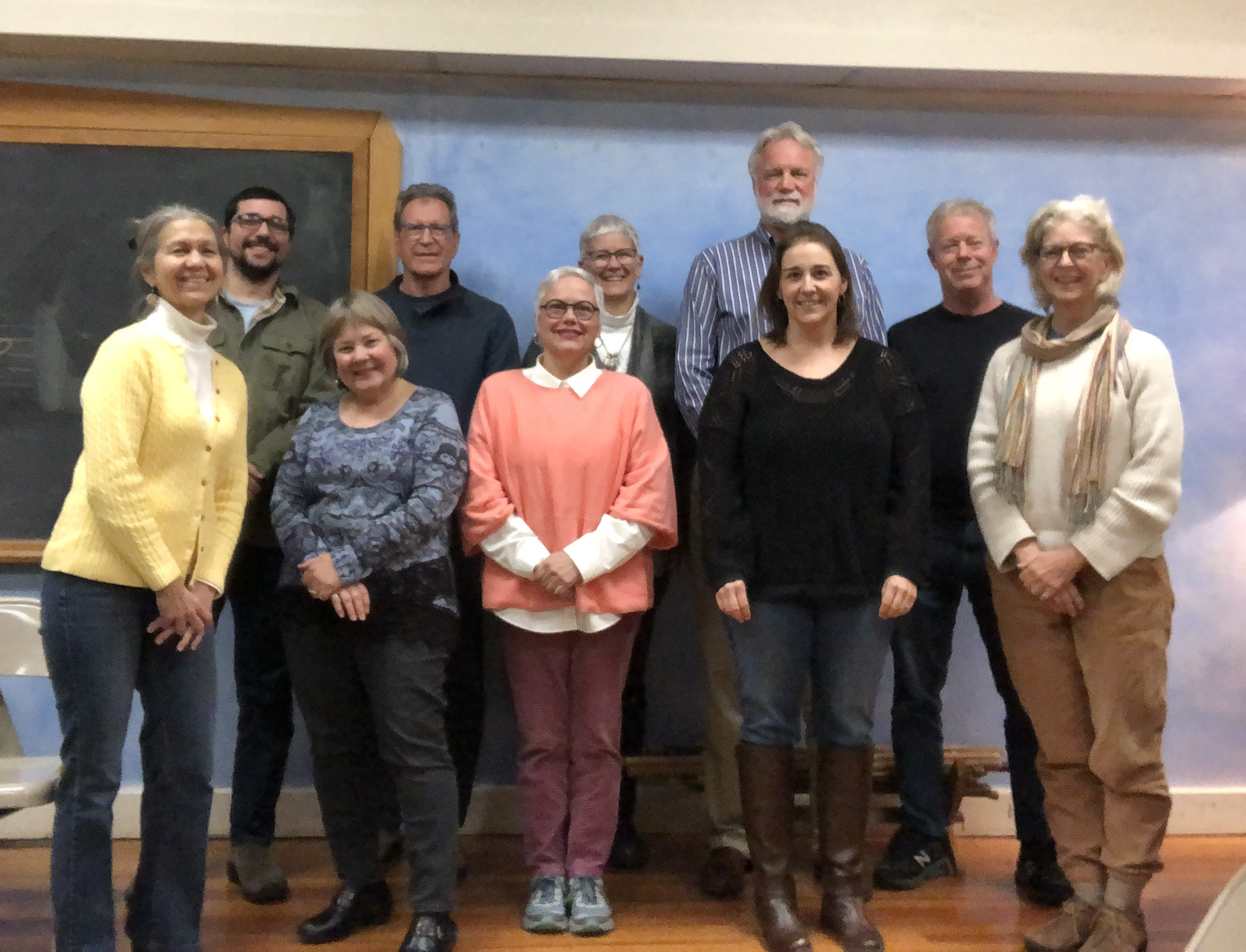

Board Of Trustees
The responsibility of the Board of Trustees is the long-term fiscal and legal sustainability of the school. The Board keeps the bigger picture alive. Its focus on the mission and vision of the school and its study of Steiner’s indications for Waldorf education and the Threefold Social Order allow it to undertake strategic planning and to measure the work of the school against its desired ends. The Board of Trustees holds regular monthly meetings to discuss the school's legal and fiscal health and to further strategic planning. Each meeting begins with an open session, during which all members of the SWS community are invited to participate. Board meetings are on the third Wednesday of each month at 6:30 pm in the Music room.
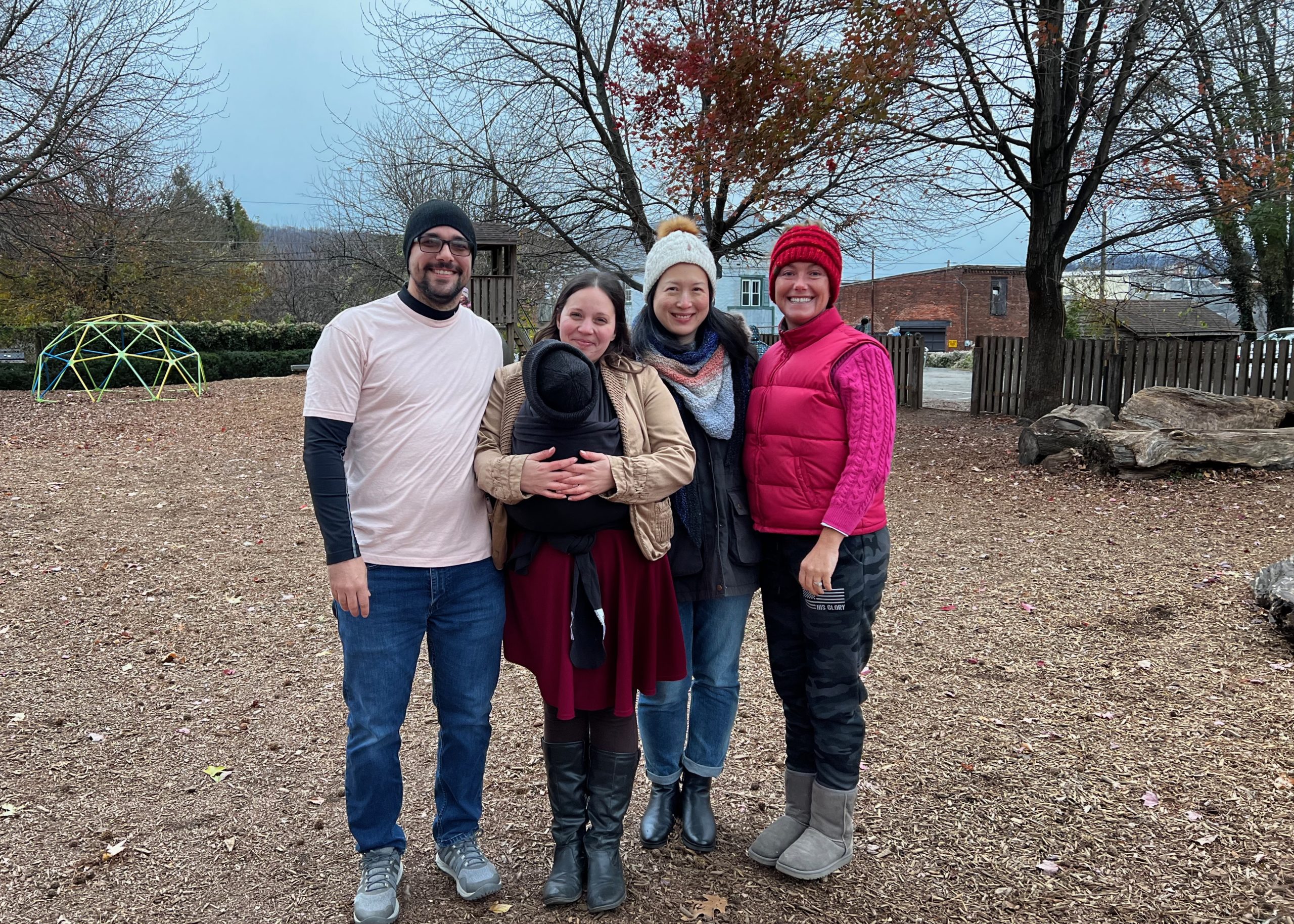

The Parent Guild
The Parent Guild is the collective parent body of the Susquehanna Waldorf School. As a community-building organization, its mission is to promote parental participation in the life of the school. The Parent Guild supports the school, fosters communication, and builds community through actively participating in planning social fundraisers such as the Winter Faire and the Auction/Gala. All parents of currently enrolled students are members of the Parent Guild. Every class in the school should have one class representative active in the Parent Guild, which meets on the third Sunday of the month at 10 am.
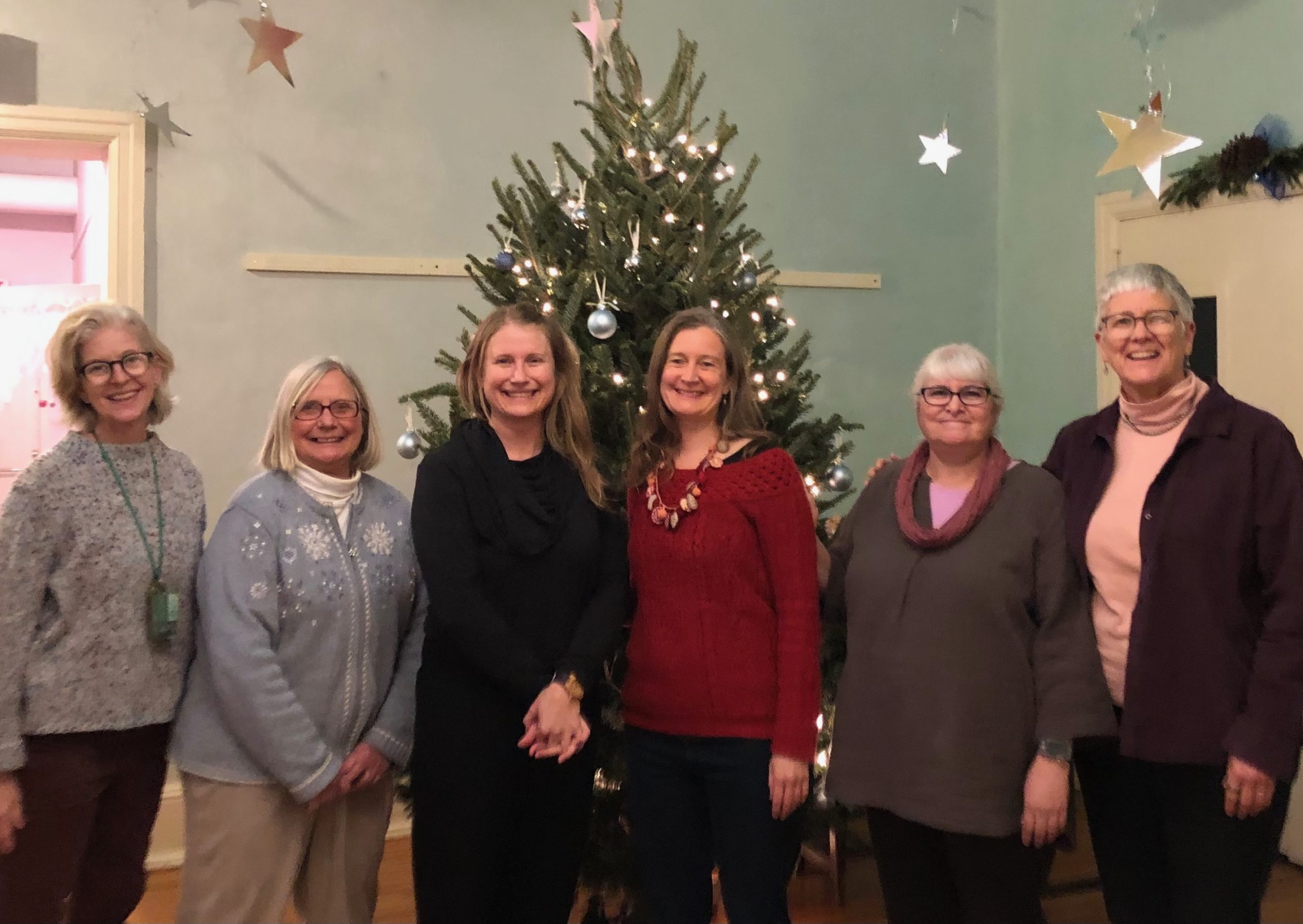

The Leadership Council carries the administrative and managerial leadership of the school and is responsible for decision-making and oversight in all matters concerning day-to-day administrative and pedagogical life. The Leadership Council membership consists of Pedagogical Co-Chairs and Department Chairs. The Leadership Council meets weekly and with the faculty during the after-school College meetings. If parents have a question or concern about any aspect of the school, they are invited to first contact the Leadership Council at LC@susquehanna.org .
Risky Play in Waldorf Education
Written by Bluebell Kindergarten teacher, Kerry Clements.


Several years ago while on the playground with my kindergarten class, I was chatting with another teacher who was new to the school and to Waldorf education. She was watching with curiosity as the students ran full speed, chasing each other with delight. Before joining our community her background and experience had been mostly in the public schools. She turned to me and asked, “Are the parents really okay with this? Running, chasing, climbing trees? It seems risky.” I answered her with, “Yes, there is some amount of risk, but the benefits far outweigh the risks.”
Risky play, forest play, rough and tumble play. Why do we support and make space for this type of play? What are the children learning and how does it serve them?
"Adventurous, child-initiated play is full of opportunities for developing creativity, invention, resilience, and problem solving." - Joan Almon, The Value of Risk in Children’s Play
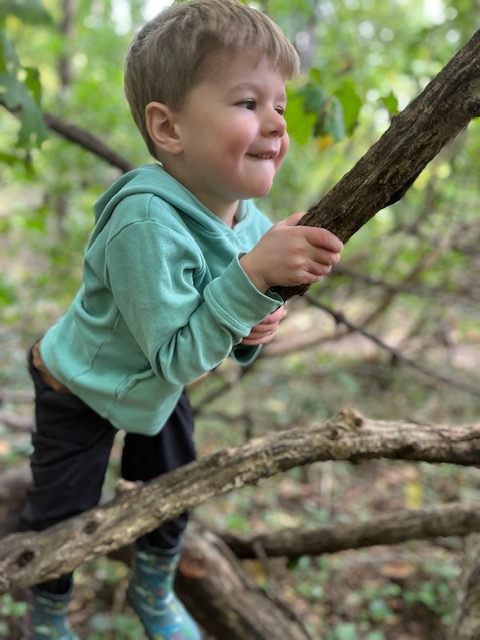

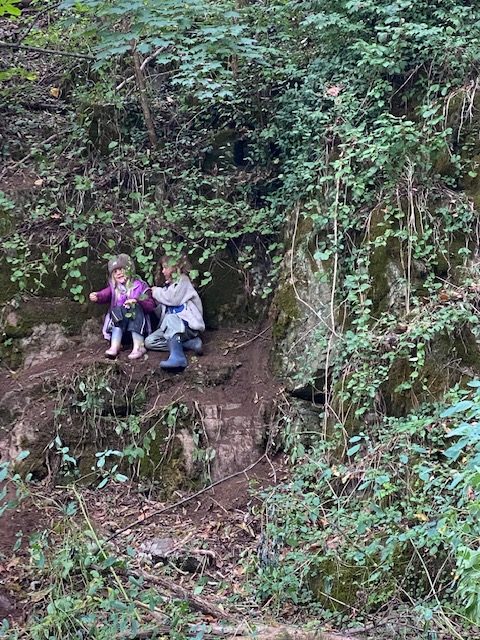

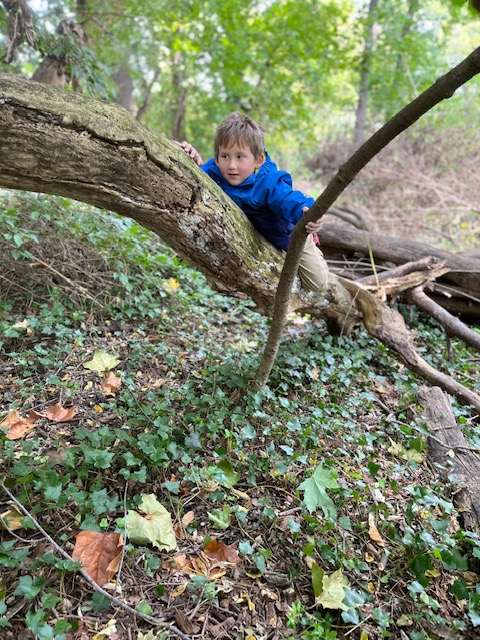

When we allow children to engage in risky play, play that involves heights, high speeds, rough and tumble play and “disappearing” play, we give children the opportunity to grow and develop, physically, emotionally and cognitively. Forest play and tree climbing are great examples of play that help children build body awareness, coordination and balance. When a child is testing a branch, jumping from a tree or playing alongside the river, they are assessing risk and problem solving. They are also developing self-knowledge and self trust through every experience of success. It is such a joy to watch a child in their first attempt to climb a tree. Timid and unsure, moving slowly, assessing with each step if they are safe. With each branch their confidence soars until they exclaim with excitement, “I did it, did you see me!?” And with each fall our children also build resiliency.
"By NOT allowing a child to take risk, we’re actually creating a child that is more unsafe.” -Angela Hanscom, Balanced and Barefoot: How Unrestricted Outdoor Play Makes for Strong, Confident, and Capable Children
But risky play is risky, or else they wouldn’t call it risky play. How do we, as teachers, parents and caregivers make space for this type of play? What tools can we give to our young ones to help them in their discovery of themselves and the world? One of the most important aspects to consider is our presence and our language. “Be careful” is one of the most common phrases we utter to young children and, unfortunately, it carries very little meaning and offers no guidance. So what can we say instead?
Here are some great ideas from BackWoodsMama.com on what to say instead of “be careful”:


Risky play is an essential component of child development. It builds cognitive skills, fine and gross motor skills and spatial awareness. Children are learning risk assessment through climbing trees, balancing on rocks and logs and running down hills. They are building confidence and knowledge of their bodies and of their capacities that will serve them for a lifetime.
"When children are faced with risk, they rise to meet and overcome it." - Joan Almon, The Value of Risk in Children’s Play
35th Anniversary Spotlight: Alum Lili Thomas-Brumme
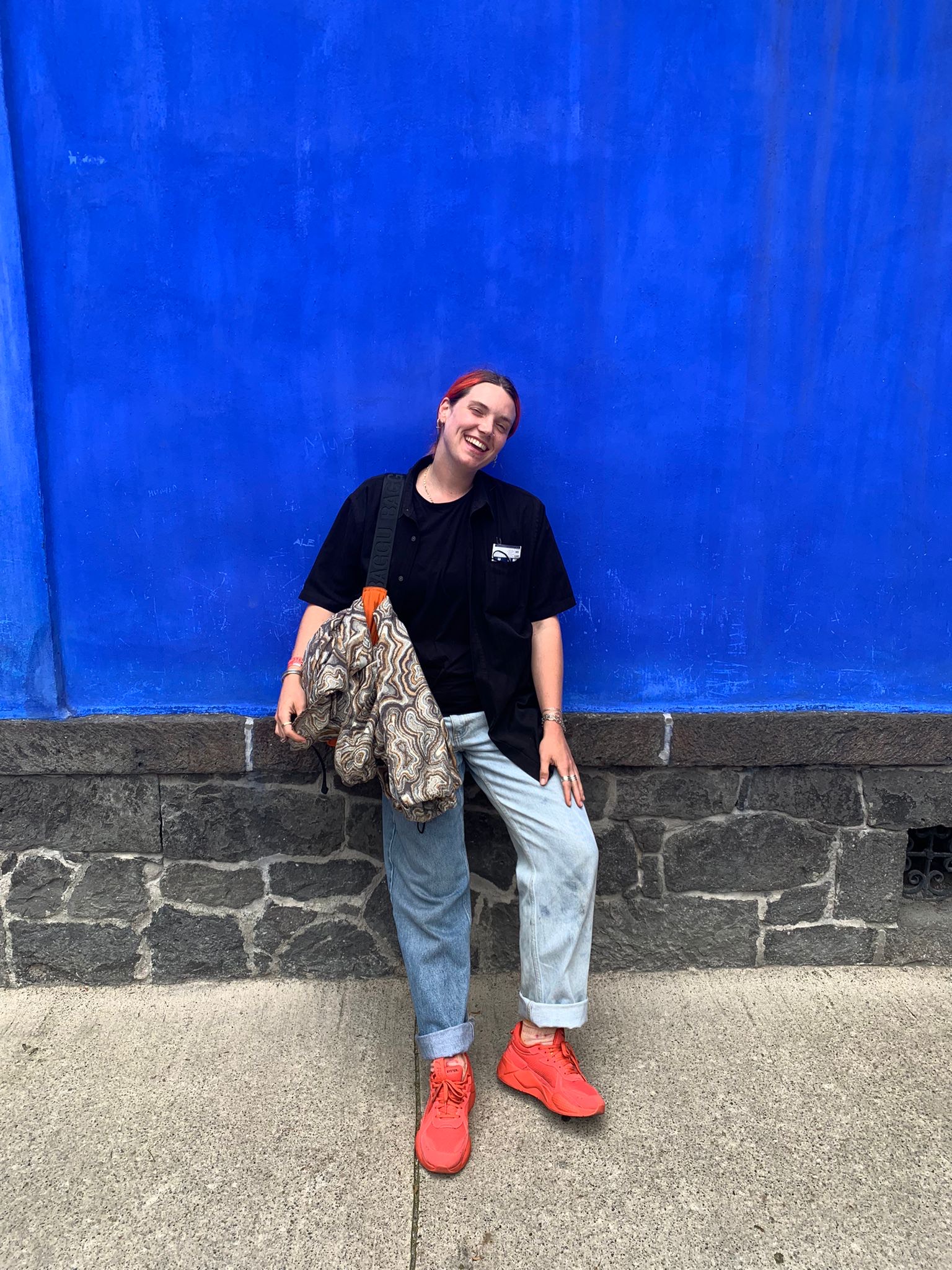

Time at SWS and where she is now...
I was a student at SWS from 5th through 8th grade and I graduated in 2006. Four formative years. Now I work as a set decorator, set dresser, and art department for film/commercial/TV in the San Francisco Bay Area.
Favorite memories of SWS?
The memories that pop into my head are very incidental times in our classroom. Of course there were the amazing field trips. We went to Rome in 8th grade which was great. Who else can say that!? But the times of just sitting and talking and playing games are my favorite memories. Mr. Martino would let us play a board game before main lesson started, and it's that kind of incidental time, growing close with people without there being too much structure, that I think of really fondly. You don’t really get that in other forms of education. There can be an expectation to be performing in a certain way but we were allowed to just be with each other.
How did SWS prepare you for your path?
Having confidence in who I am. When I was in public elementary school, it was like anybody who didn't fit the mold, anyone who didn't get these grades on standardized testing was wrong. It was all about how you performed in numbers and how you could conform. And if you didn't conform, if you were the cog that didn't fit in the wheel, it was a problem with the public school because they had to come up with a whole personalized education plan just to help you because you were the one that didn't fit. I just always felt wrong and broken in a lot of ways.
Coming to SWS, it was a total 180. I was offered support. “We are here for you and for how you grow. We’re going to work with the skills and the learning that you have and that you need and we’re going to do this together.” It wasn't just the teachers and the students. When I was having trouble in math, my teacher would take the kid who was really good at math and tell us to study together. And so it was the confidence of knowing that I wasn’t broken, I wasn’t the problem, I am strong for having the mind and the skills that I have. These are the things that make me the person that I am. For me, personally, that was huge. I say sometimes that Waldorf education totally saved my life. And it feels really dramatic but I really believe it to be true. I don’t know where I would be if I didn’t grow up having that support and confidence. I wouldn’t be where I am.
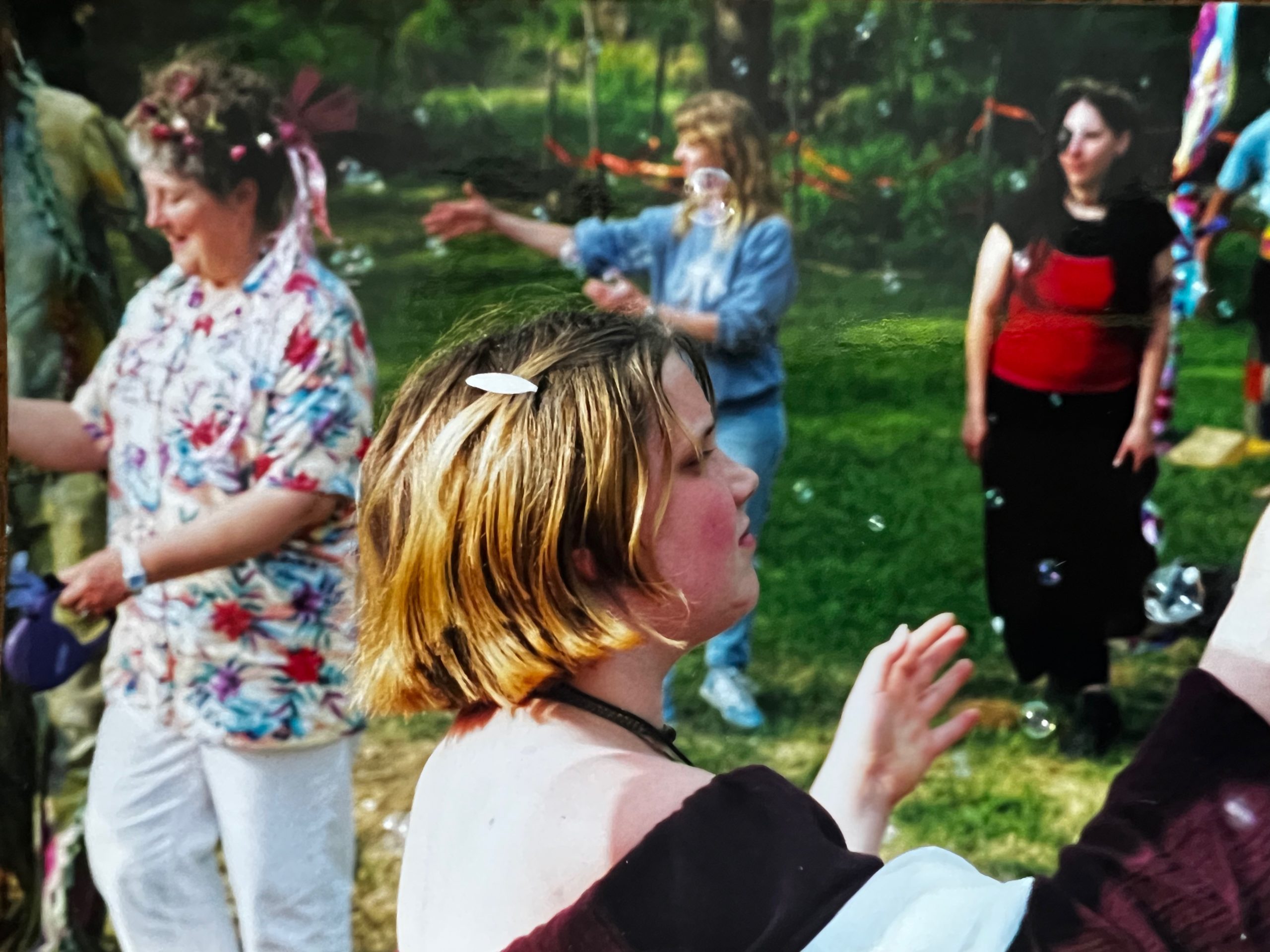

Has your perspective of your education at SWS shifted over the years?
I think even when I was at SWS, I loved it and knew that it was better than anything else that I could be doing. Elementary education ended at 4th grade at the public school I was at before SWS and three different elementary schools were combined for middle school. I was terrified. Of the amount of people, of going to a new place, and since I already had trouble in elementary school. I was told, “You can’t take a test with everyone else, we’ll send you to a different room.” I was already the weird kid. I remember telling my mom, “I am not going to 5th grade, I’m going to fail 4th grade” and she was like “hm, okay, let’s find something else.”
Going to SWS, without having words for it at the time, I remember the feeling of being alive. And, even though I couldn’t say why or what, I just felt different. I felt brighter. And I think that that perspective has gotten deeper over the years. With age, I’ve been able to actually understand and pinpoint the reasons why, and know myself in a more concrete way, this is why it worked, this is why it’s good, this is what it did for me.
What makes SWS special?
I think the community aspect of it is huge. Specifically at SWS because it’s so small and concentrated. It was really amazing to be there and to know people so deeply. The community and the support to grow into who you’re meant to be and how everyone is supporting each other doing that is so special. On a broad scale of Waldorf education, when I meet another Waldorf kid out in the world, we’re both like “Wowwww!!!” Even from an entirely different state, there’s a deep level of connection. Individualism is a very American perspective, like "head down, concentrate on your own, take care of only yourself," and Waldorf education teaches something different from that. It's about bringing people together.
Hippity Hoppity Hoo! Welcome Baby Landon & Bunny Nora!
Written by Dandelion Kindergarten teacher, Nikki Hill.
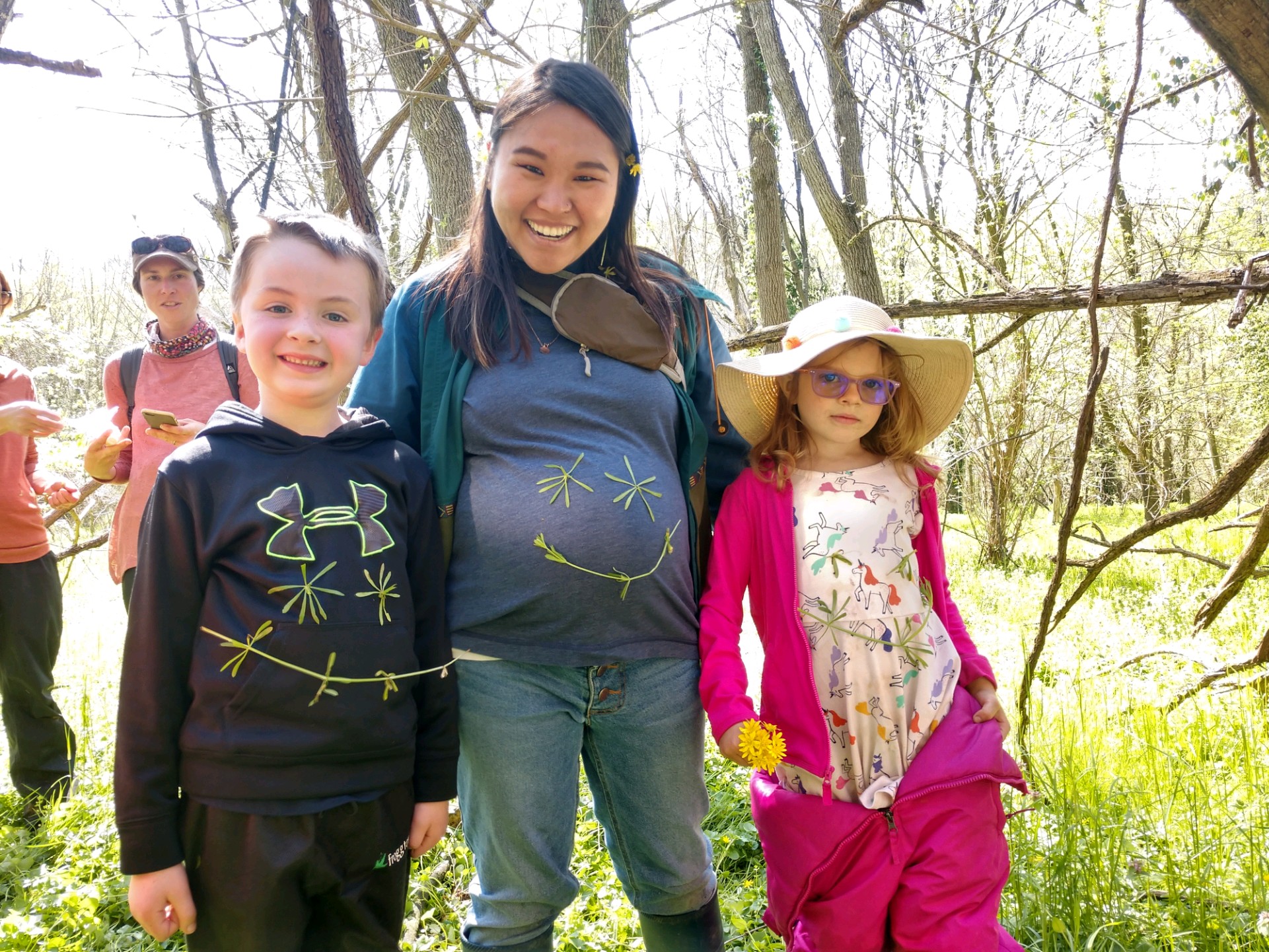

What a fun and exciting time for the Dandelion classroom. So many babies were born, making some of our classmates big brothers to little sisters and others big brothers to little brothers. It has been a joy to welcome new life into the world and into our hearts.
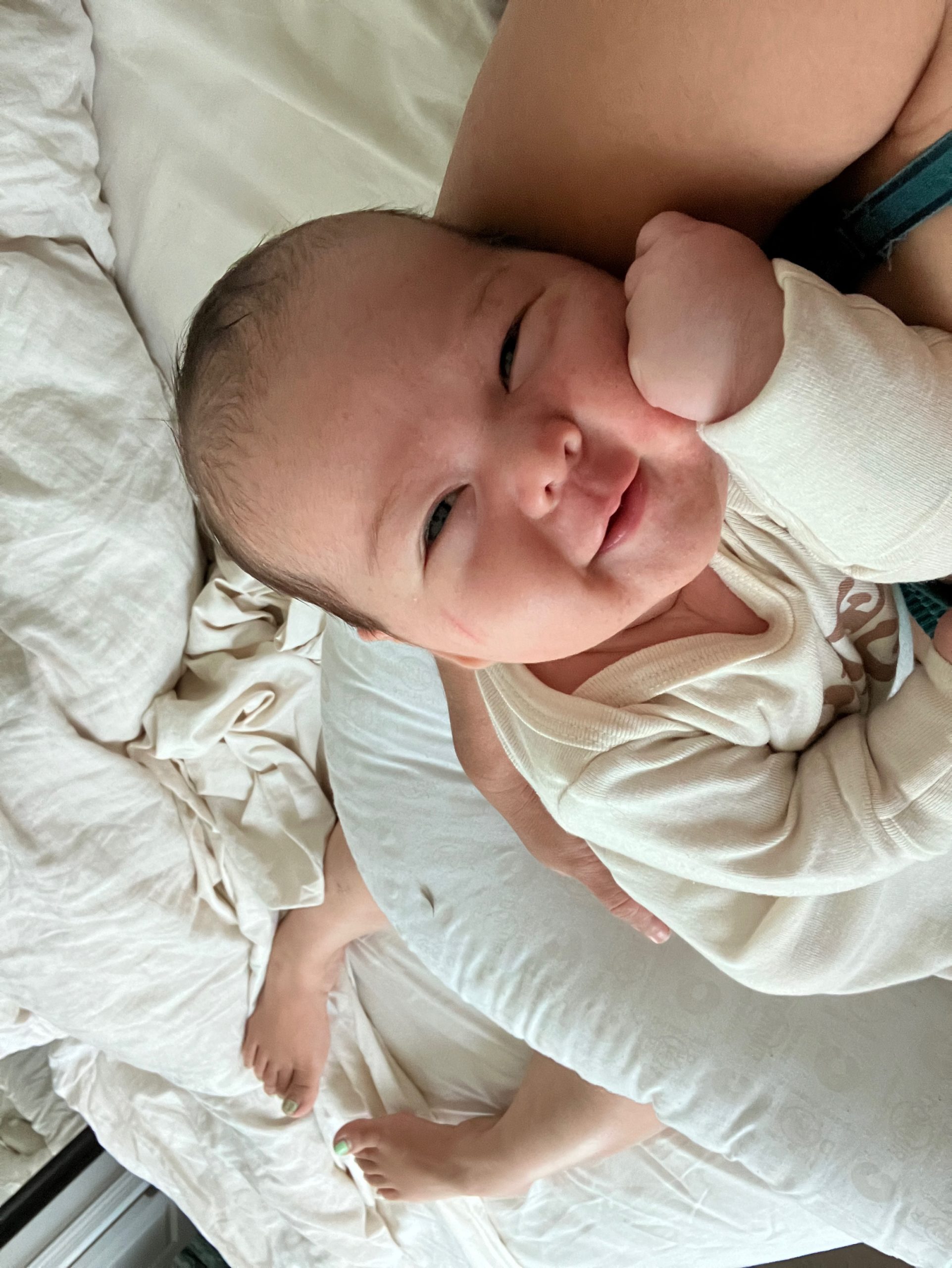

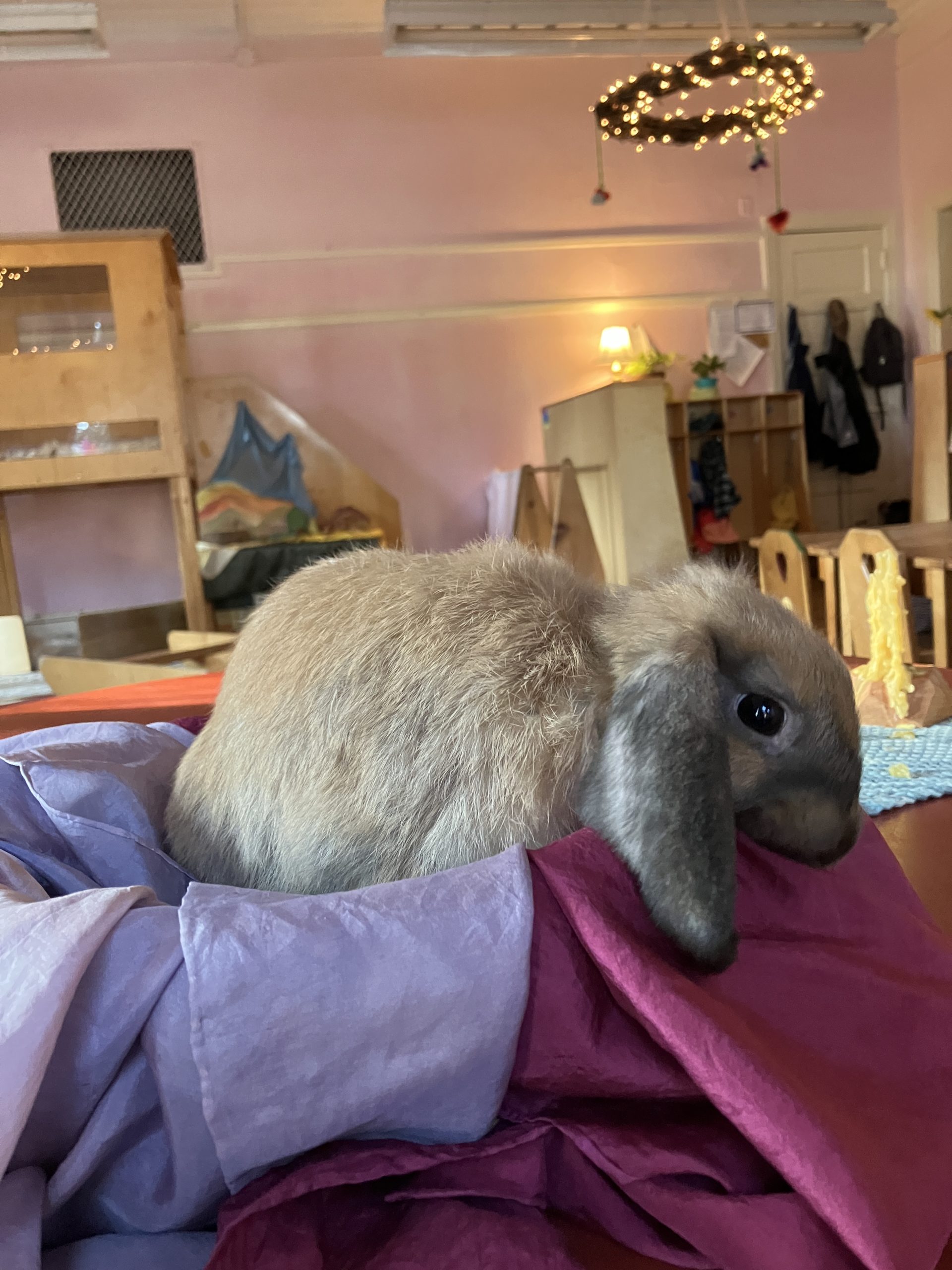

Welcome to the newest members of the Dandelion classroom: Miss Nikki's son, Landon, and Nora, our baby bunny. Although Landon does not come to the classroom very often, all the children saw Miss Nikki's tummy grow and grow and grow throughout last year's adventures and now there is a little picture of Landon in the classroom that the kiddos can see. The other exciting member has been our dear baby bunny, Nora. Nora has been enjoying all the snuggles, pets, and treats the kiddos have been giving her on a daily basis.
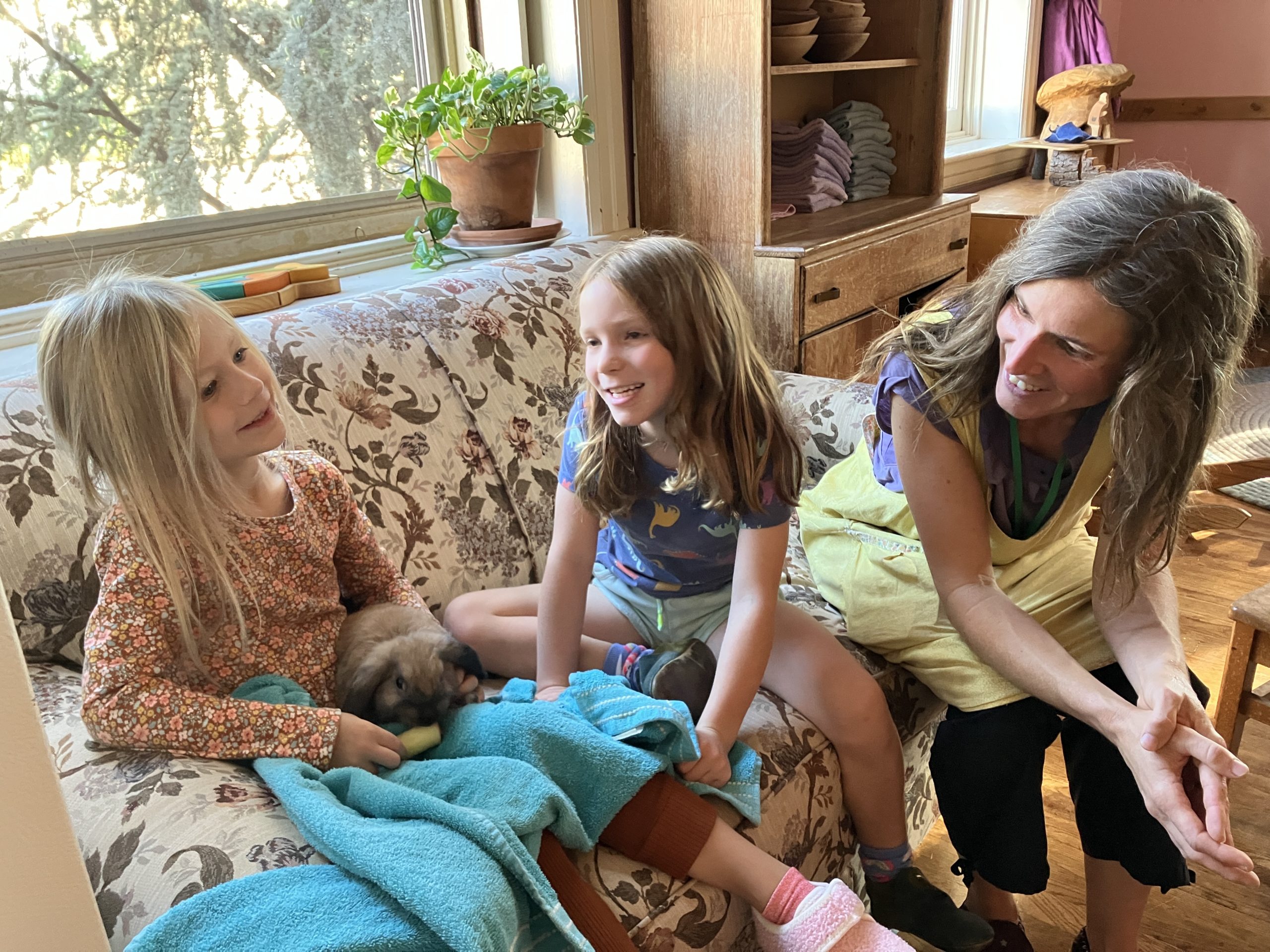

Nora's favorite day so far has been Tuesday soup day because she is almost guaranteed to get a nibble of a juicy carrot or some little scraps of sweet potatoes that have escaped the chopping board and made their way to the floor. She also likes when the children all snuggle up on our new couch in the classroom and give her lots of love and sweet snuggles. Most mornings she is freely hopping around the Dandelion classroom, exploring all the toys, nooks, and crannies, just like the Dandelion children are. At circle time, she sometimes observes the children from her high perch in the loft looking out over us, ensuring that we are using our sturdy feet, kind hands, and beautiful singing voices. Nora is quite the explorer and loves visitors and snuggles. If you ever want to say hi to her and give her some pets, snuggles, and love, please let Miss Nikki know and she would be happy to have you visit.

